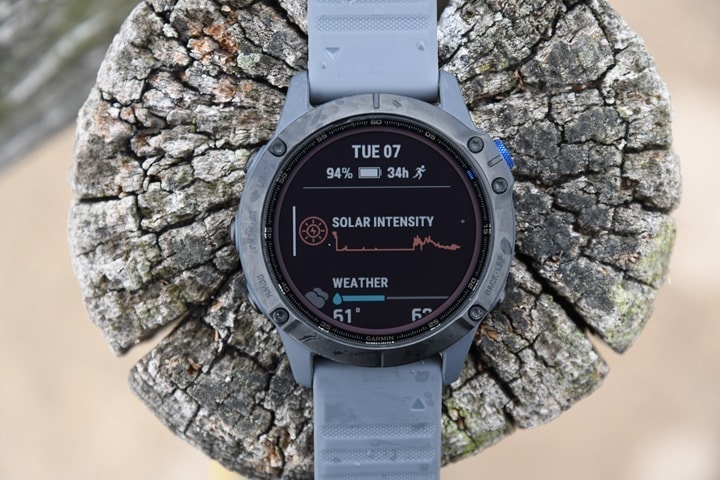
Today Garmin has extended the solar option on the Fenix 6 series to include the Fenix 6S Pro and Fenix 6 Pro units, completing the family that started last year with the Fenix 6X Pro Solar. Now all three Pro units offer a solar-equipped option. In addition, Garmin also announced a new Garmin Instinct Solar lineup too. Beyond adding in solar panel tech, the watches also get some new features such as Indoor Climbing and Bouldering, as well as a new surfing integration with Surfline sessions.
Now, for this review, I’m truncating it to focus on the aspects that are new or different. While I’ve been using these units for about a month now, the reality is that almost no aspects of them are different than the existing Fenix 6 Pro series…except the solar panel pieces. In addition to the new software bits that have largely been available in beta on the existing Fenix 6 series watches for the past month (such as the new sleep tracking and heart rate broadcasting bits).
Point being, while I could re-write an entire review talking about basics like step tracking and how to configure sport data pages, or how to sync to Spotify – I’ve already done that. And nothing has changed in those areas. That’s all the same. And in using these watches on my wrist 24×7 since then – I can confirm no differences between a non-Solar Fenix 6 Pro and a Solar Fenix 6 Pro in those areas. In fact, even the GPS & HR accuracy aspects haven’t really changed – but I love some accuracy charts – so you’ll get those down below for fun.
With that, let’s dive into it!
What’s new:
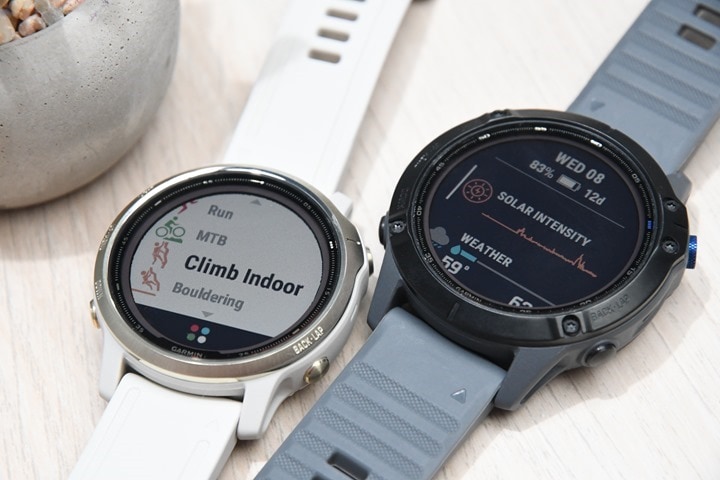
Now, there’s actually more to the Fenix 6 Pro Solar units than just a touch bit of solar panel. There’s also some new software features. But fear not, these non-solar specific features are also being added to all Fenix 6 series units. But, to recap everything that’s new there’s:
– Added under-glass solar panel to Fenix 6S Pro & Fenix 6 Pro
– Added around the edge solar panel to Fenix 6S Pro & Fenix 6 Pro
– Added Indoor Climb activity profile: Tracks indoor climbing metrics (more on this in a second)
– Added Bouldering activity profile (indoors): Similar to the Indoor climb profile, but for Bouldering.
– Added new Surfing activity profile with Surfline Sessions to create videos with data overlays
Oh –and just in case you missed it above: Yes, all those new software features are coming to the Fenix 6 series in the next firmware update. Speaking of the other Fenix 6 units, here’s a family photo of the Fenix 6S Pro Solar (left), Fenix 6 Pro Solar (middle), and Fenix 6X Pro Solar (right). You’re seeing some slight reflections off the ceiling skylight thingy. There’s no lights turned on in the studio for this photo, and the photo isn’t edited in any way. Straight off the camera card.
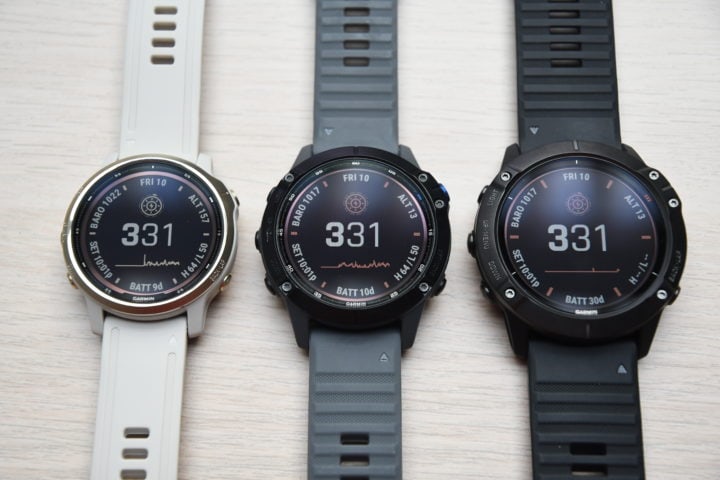
Doing a quick lap around through each of the new non-solar aspects (since the entire next section is solar focused), first up is mountain bike Grit and Flow. For those that put on their Garmin Edge cap, you’ll remember they came out last spring with the Edge 530 and Edge 830. The Edge 1030 got them in a firmware update, then the Edge 1030 Plus and even Edge 130 Plus a few weeks back. Also, they’ve been added in to the Fenix 6 betas and firmware in the last version – but I figured I’d cover them here too.
On the watch, you’ll select the mountain bike profile (it’s not enabled by default, so you’ll want to add it from the sports menu). Then, you’ll need to go and add these fields to your data fields. That’s kinda weird, since on a Garmin Edge device it adds these automatically. In any case, you’ll find them under the ‘Other’ bucket:
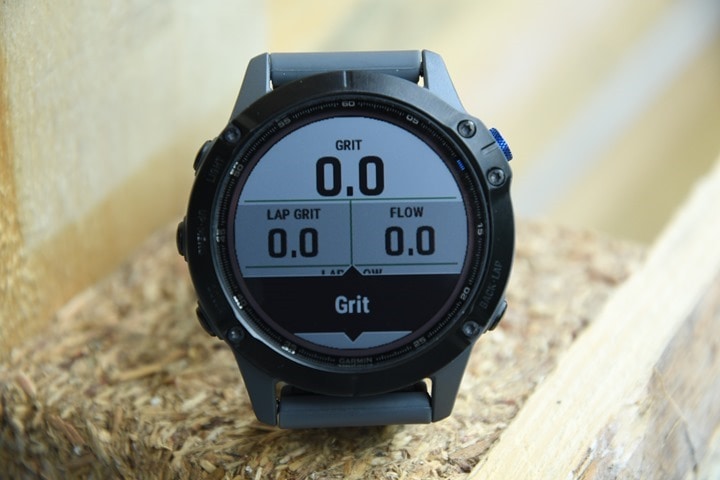
There’s Grit, Lap Grit, Flow, and Lap Flow. Here’s what they look like added to a single page:
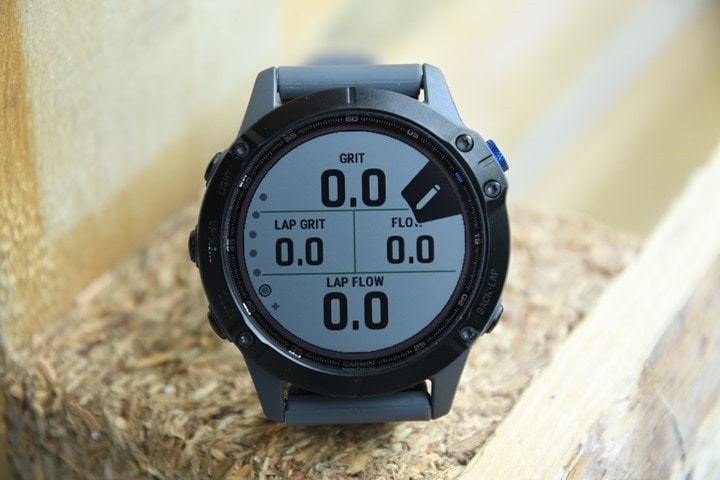
Then, go out and ride. I haven’t had any good mountain bike chances as of late. But, here’s what the data will look like after the fact:

Note however, that there’s a slight difference to the Garmin Edge units – notably that they don’t include jump counting in the Fenix metrics. I suspect that’s because with your hands potentially flapping around that’d dork up the accelerometer/gyro data (whereas an Edge is mounted to your bike – and ideally not flapping its wings mid-flight).
Next, there’s the new Indoor Climbing and Bouldering profiles.
In case you’re wondering what the difference is, essentially Indoor Climbing you use ropes to get to the top, whereas Bouldering typically tops out at lower heights (max 3-4 meters), so you’d do it without ropes. You can read this to understand the nuances.
Indoor Climbing Activity Profile:
When you first begin an Indoor Climb workout, it’ll ask whether you’d like to track the route stats. Again, this is all indoors, so it’s not using GPS. When you choose yes, you’ll then select which grading system to use.
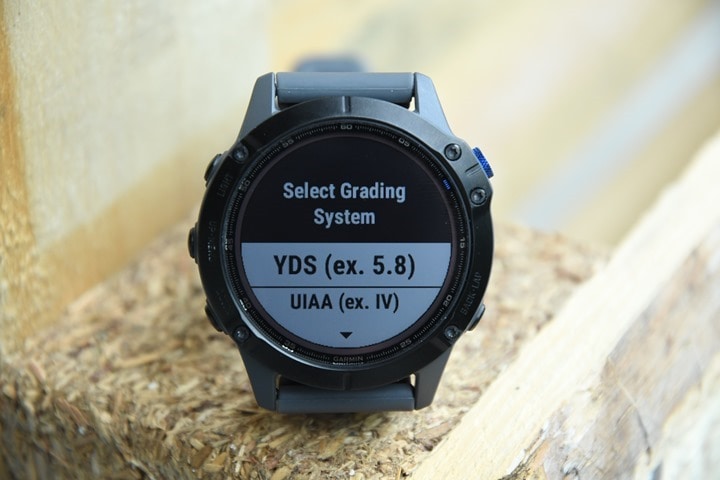
In total there’s YDS, UIAA, French, British Adj., British Tech, Ewbank, Brazilian, and Saxon. You can change this mid-activity as well within the Climbing Profile settings.
Once you’ve selected a grading system, you’ll then select the difficulty:
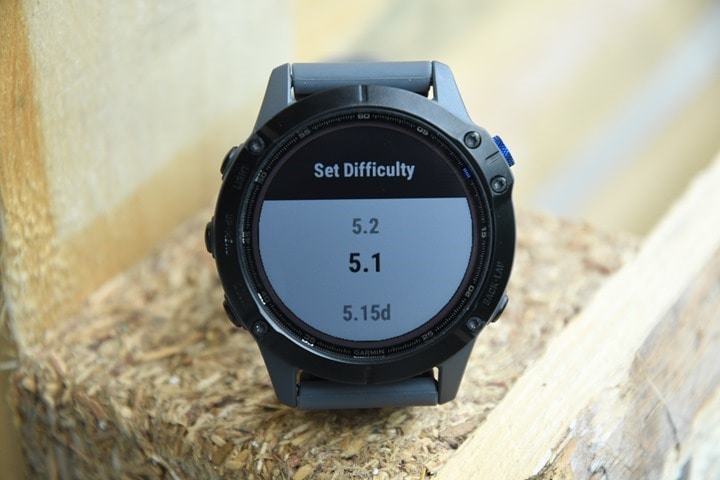
At this point the watch is ready to begin (after you press start). It’ll track time, total ascent, and heart rate on one screen (plus showing you the difficulty at the top).
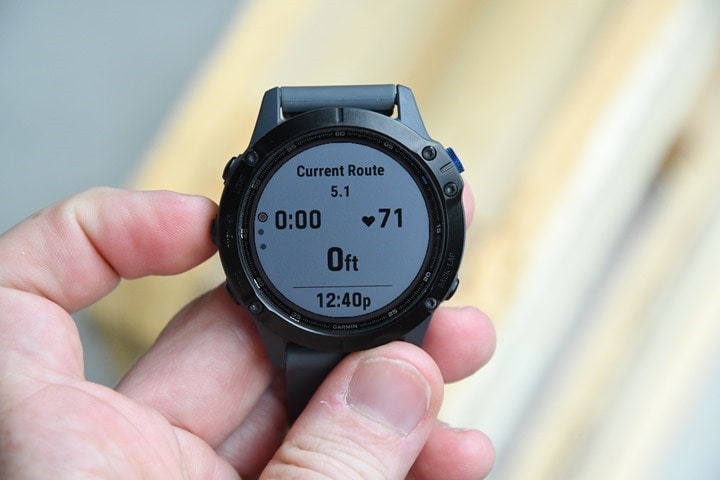
There’s also then a page for Last Route:
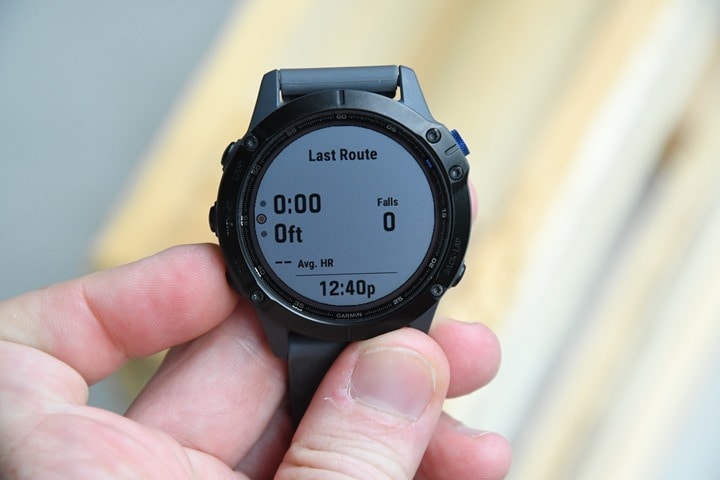
As well as a page for Total Routes:
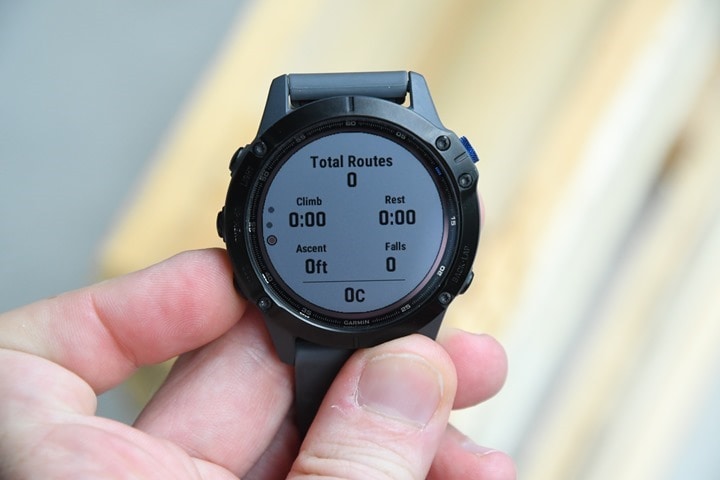
Once you’ve completed the route you’ll hit the lap key to mark it as complete. After which it’ll ask if you’ve had any falls. From there it’ll go into a rest screen and wait for your next climb to begin (when you hit the lap marker). In that sense, it’s kinda like the indoor pool swimming with sets.
Afterwards on Garmin Connect, it’ll show you a breakdown of the details. And of course it’ll sync that off to 3rd party apps/platforms like Strava/etc…though, those don’t support all these metrics, so ultimately it’ll be pretty limited in what you see on 3rd party sites.
Bouldering Activity Profile:
Next, the Bouldering activity profile is pretty similar to that of the Indoor climbing one.
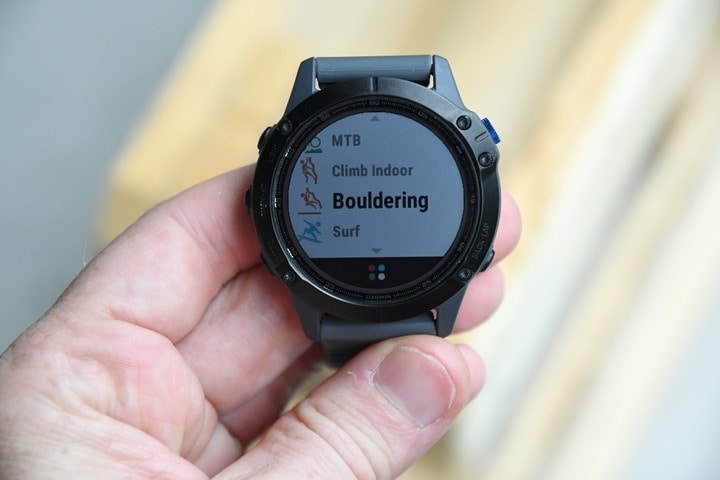
First you’ll select the grading system, in this case it supports V-Scale, Font, and Dankyu:
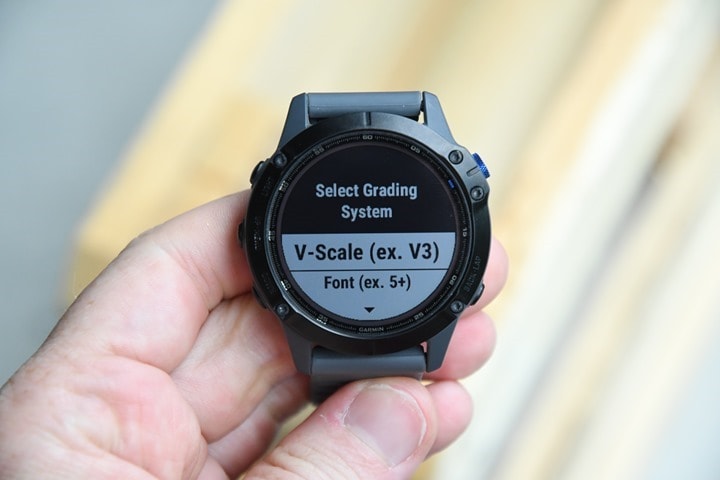
Next, you’ll select the difficulty of the problem you’re about to climb. The exact min/max levels it supports will vary based on which grading system you’re using:
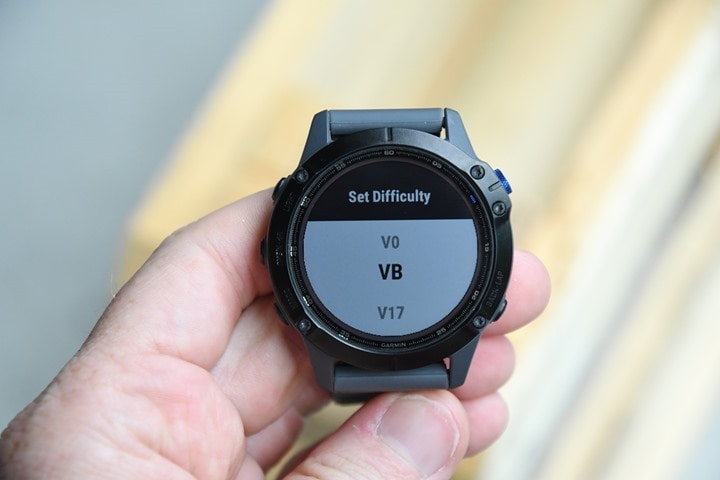
Once ready to climb it’ll show you the problem difficulty at the top, the time, and your heart rate:
After you’ve finished climbing the route you’ll press the lap key just like with indoor climbing. This will then give you three options: Mark route as completed, mark as attempted, or discard the whole chicken. Like with indoor climbing you can see both the last route and total route data:
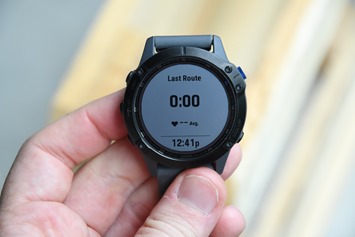
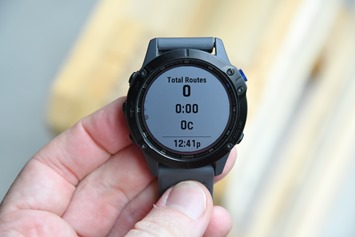
I’m not exactly a climber, however, DesFit did get the chance to try this part out – so if that’s your cup of tea, hit up his video on it.
That said, ironically, by pure coincidence I stumbled upon a brand new facility that just opened up a mere 3-minute pedal from me. So far I’ve just been a stalker and looked through the windows – but maybe I’ll give it a poke.
Surfing profile with Surfline integration:
Finally, there’s the new surfing profile data metrics with Surfline integration. You may have seen the surfing metrics added as part of the more recent Garmin Fenix 6 betas, in fact, they were actually looking for people to beta test it (which, by the looks of it was pretty limited in finding people).
In any case, the way it works is that you’ll first open the surf activity profile, and then it’ll track the waves surfed, maximum speed reached, and distance travelled within the profile.
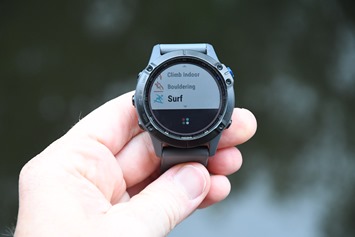
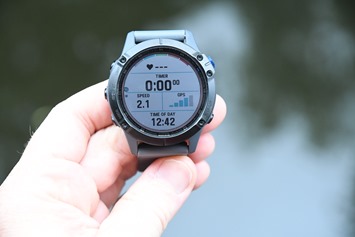
What’s really interesting here though is Garmin is integrating with Surfline for data overlays with video integration. Surfline is a surfing site that you can look up tons of data about nearby spots. Wave conditions and such. However, in addition to that, they’ve got some 400 cameras pointed at waves that are recording to the cloud. Currently they have an Apple Watch app that allows you to record your sessions on the watch, and then later on the site will find the exact video clips of you by cross-referencing the timestamps and GPS data.
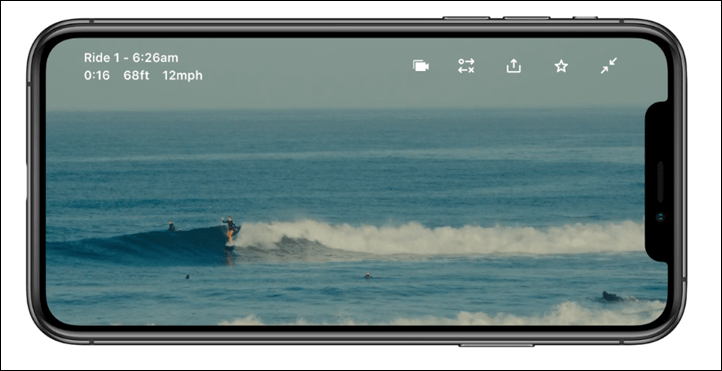
So, with the Fenix integration that’s all supposed to work in the same manner. However, there’s no Surfline cameras anywhere near me (or even remotely near me). The nearest appears to be on the other side of the English channel. But…at least it looks pretty there:
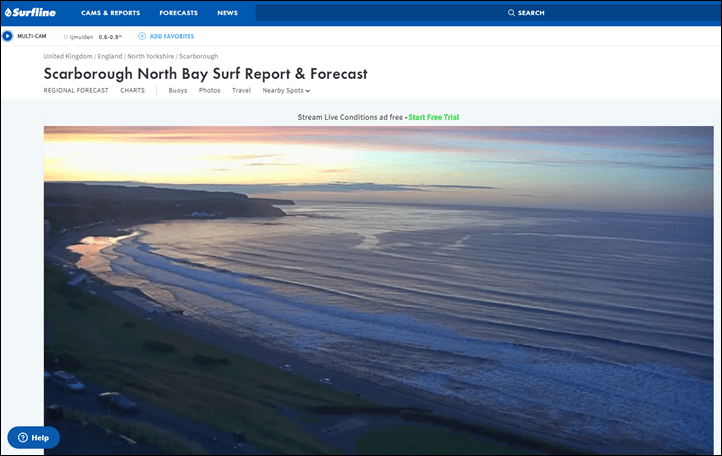
In any case, I’m definitely the wrong person to test this bit out. But it does show Garmin’s ever-expanding sport profiles, and specifically having actual data for those profiles. While some runners or cyclists may be like ‘That’s a useless feature…to me’, the thing Garmin has figured out that most other companies haven’t is that one person’s useless feature is another person’s most important feature.
There’s currently surf watches in the market already, so clearly there’s demand there. From Garmin’s perspective it’s relatively trivial to take an existing piece of hardware and add a few extra metrics. Whereas the lift for a new company to create a new smartwatch in 2020 is almost impossibly hard to get enough demand to make it work.
In any case, if you’ve got a Fenix 6 series watch, you can test this feature out today via the beta. Or, simply wait for it to hit production probably any day now.
Solar & Battery Details:
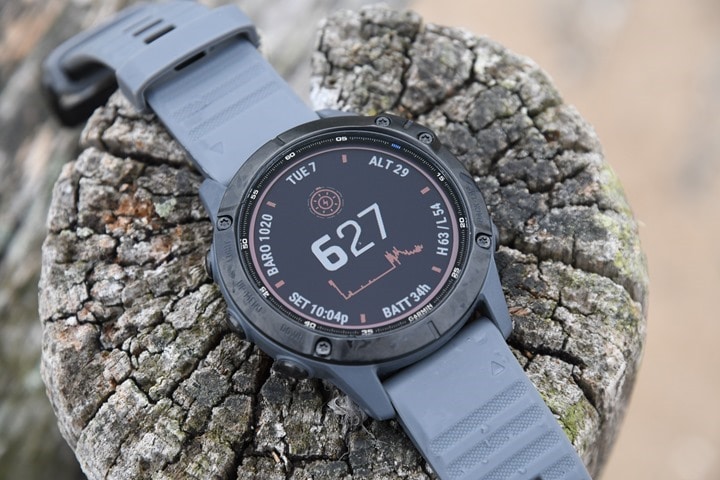
When it comes to the Solar aspects added to the Fenix 6 & 6S, they’re basically identical to that of the Fenix 6X Solar that was launched last summer. Whereas if you looked at the new Garmin Instinct Solar units, those have a different panel arrangement than the Fenix series.
Now, as you may remember from my review last year, Garmin often sees the ‘X’ variant of the Fenix as a place to trial out new technologies before introducing them elsewhere. Last year, that was solar with the Fenix 6X Solar, whereas this year that’s being added to multiple units. The solar pieces all come from an acquisition of technologies from French company SunPartner Technologies. Garmin actually quietly made that acquisition back when the company filed for insolvency, a long time before they announced it in the Fenix 6X Solar last year.
On all of the solar-enabled Fenix 6 units you’ll notice a very thin 1mm wide strip just on the inside of the bezel. This is the first of two solar pieces.
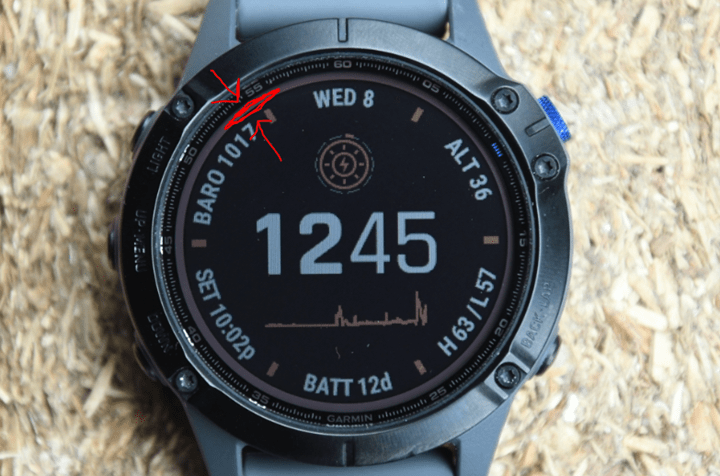
This thin strip has 100% photovoltaic levels, meaning, it’s receiving 100% of the sun’s goodness and turning that into solar power. It’s also clearly visible in bright light, though you’d just assume it was a bezel design element. Inside without bright light, this strip almost disappears and blends into the bezel.
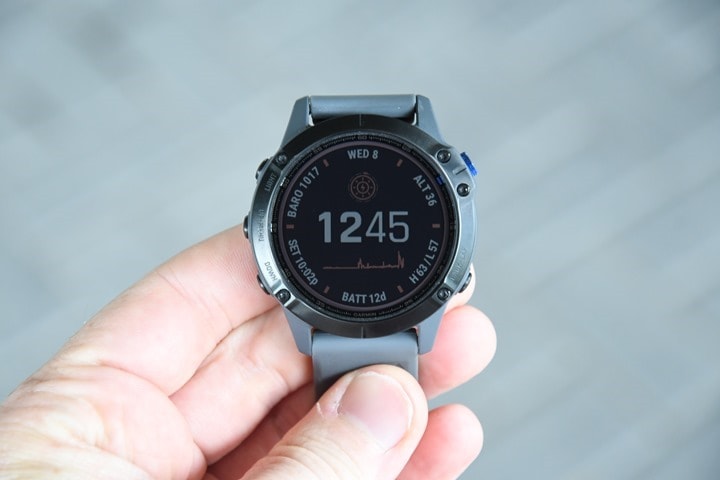
However, there’s a second solar panel you can’t see – despite being the entire display face. Under the display is another solar panel that has a 10% photovoltaic level. This panel is of course far larger than that of the thin bezel strip, but is also getting 10% of the sun’s rays, due to the display blocking much of it. Importantly though, both panels are fully under a single sheet of Gorilla Glass (specifically Corning Gorilla Glass 3 with DX Coating). Meaning, you won’t accidentally scratch the bezel solar panel anymore than you’d normally scratch your watch face.
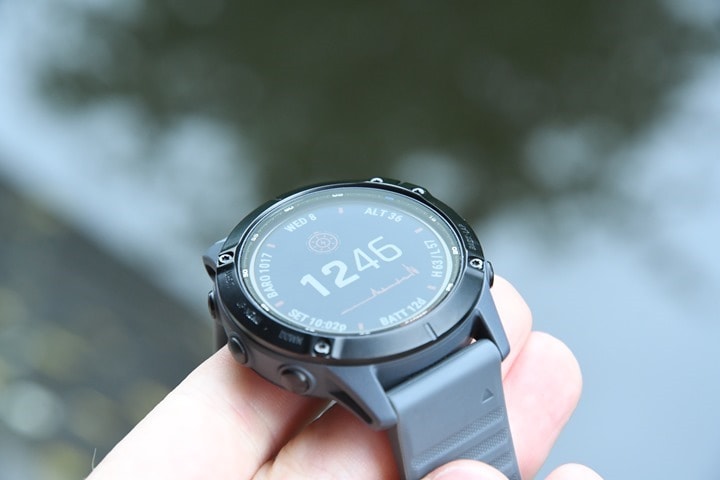
Speaking of that watch face, you’ll notice that there’s a little sun atop the default watch face. That sun is actually showing you the current intensity level. Around the edge of the little sun are 10 pieces, each indicating 10% of full intensity. So if you look at the below picture you’ll see the sun is coming in at 0% intensity as I’m in the shade:
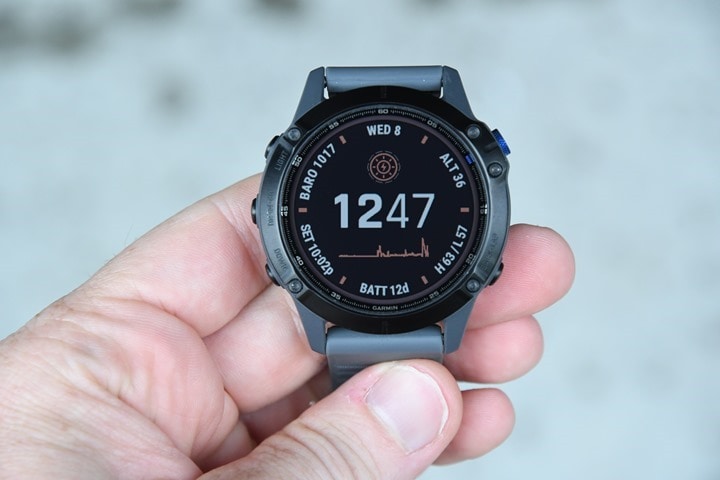
Next, another photo out in some broken clouds conditions and you can see it’s at about 70%:
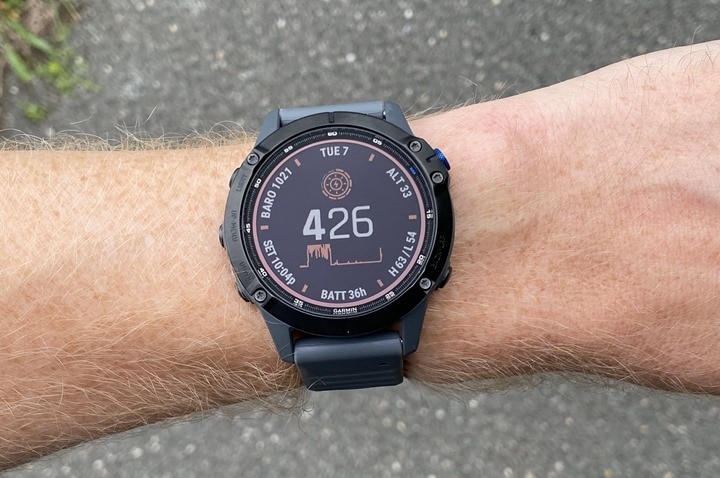
And here’s another at 100% intensity, with all lines lit up as well as the sun itself:
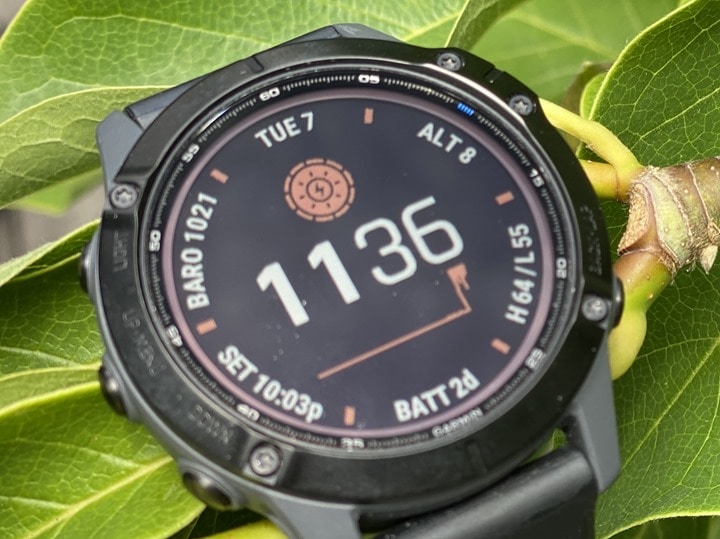
You can also see this in the Widget Glances too:
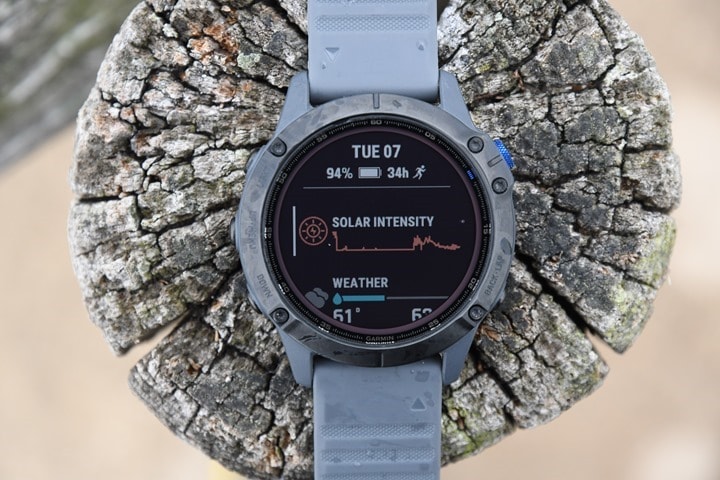
And then a plot over the last 6 hours of activity as well:
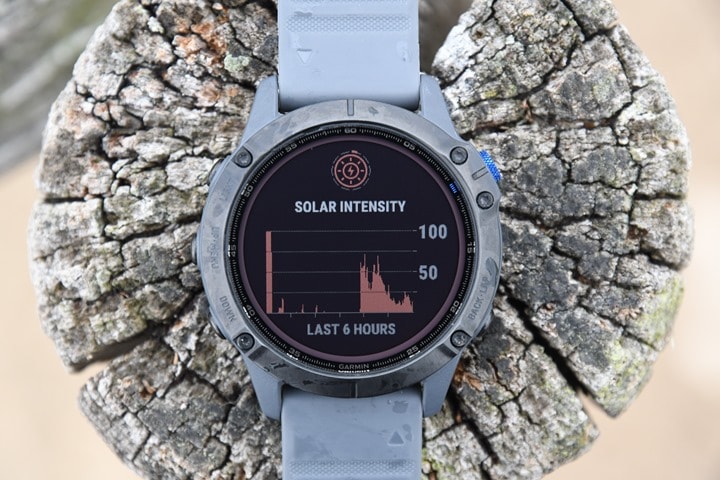
In addition, you can look back at any day of history you want to via Garmin Connect Mobile:
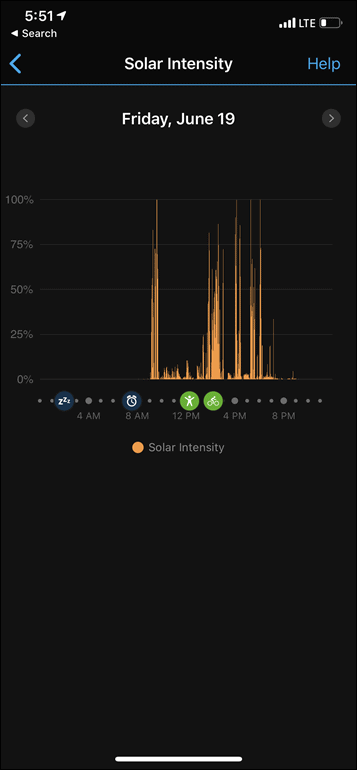
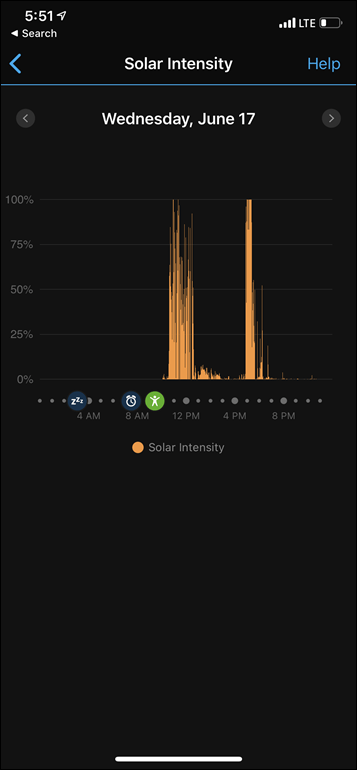
The goal of the solar here isn’t to fully power the watch, under GPS or otherwise. Instead, it’s to provide incremental battery life (more on my testing on this in a second). Garmin notes this in their super-detailed battery life chart. Note specifically the assumption of 3 hours per day of solar light at a pretty high intensity (full sun basically). That goes both ways though. If you’re mid-summer and spending the day at the beach (or work outside), then you’ll way overachieve here. Versus if it’s mid-winter and you’re indoors…then not so much.

*Assumes all-day wear with 3 hours per day in 50,000 lux conditions
**Assumes use in 50,000 lux conditions
Wait, so what’s 50,000 lux you ask? It’s a pretty sunny day, though, not living in Arizona in summer kinda sunny. Here’s what Wikipedia says about it:
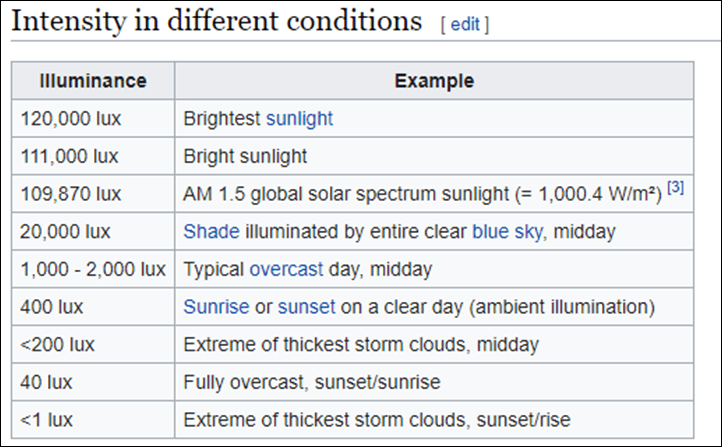
Now Garmin doesn’t ever show lux levels in the solar widgets. Instead, they show a relative intensity in terms of solar power. On a pure sunny day here in July in the Netherlands, I easily can get the full sun widget to illuminate. But, I can also do that too even on a high light overcast day (meaning, a super high thin cloud layer). Even with a handful of clouds meandering around.
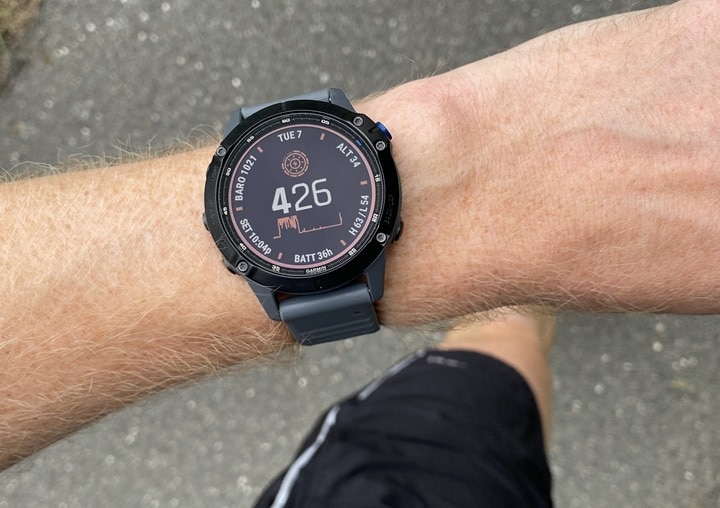
Meanwhile, for a portion of my hike when it was raining I was getting anywhere between 20-50% solar intensity levels, depending on the specific cloud passing by. Point is, it’s not as drastic as you’d think.
Here’s the basic main takeaways though:
A) If you’re spending 3+ hours outdoors (non-workout mode) you might be able to pull off something close to battery neutral in a pared down configuration (not much notifications/etc…).
B) While outdoors on longer hikes in significant sun, solar will definitely extend your battery life, potentially a lot. Or potentially not at all.
In order to test this, I went out for a longer hike/walk thing yesterday. For this test I compared a Fenix 6 Pro with a Fenix 6 Pro Solar, identically configured with every possible setting I could find. The theory was to wander for about 3 hours in the sun in reasonably wide open areas (dunes mostly), but of course, the weather dorked with my plans, so it starts off sunny and then eventually got a bit rainy.
Here’s the battery burn charts for the meander:

As you can see, it’s basically impossible to tell the difference between the two Fenix units, even after 3 hours. I’m sure brighter sun would have helped the Fenix, though in looking at some other 1-2 hour activities it hasn’t varied a ton either. The nuance between the burn rates at that point is really challenging.
In talking with Garmin about battery burn rates recorded to files, in general you’ll get more concrete results with longer activities than shorter ones. Also, because of the frequency in which the battery value is updated, a few seconds one way or the other when we’re talking 0.08% difference can result in a big swing (since it’s only recorded at whole numbers). That’s fair, and is pretty common for any battery technology that if you really want to get a good idea of the battery burn rates that you need to measure longer periods of time.
And if we look at a longer hike I did last summer with the Fenix 6X Solar and Fenix 6 non-solar side by side, you can see the impact of the battery burn rate once I hit the sun coming out of the tree line. When I’m below the tree-line in the trees (up till about 1hr 30mins), you can see battery burn rate is about equal, but once I clear the tree-line (around 1hr 30 marker), and am back into the sun, battery life burn on the 6X Solar slows. Pretty cool. Note that in that case we want to ignore the slope of the non-Solar unit, since it has a smaller battery, but instead note the significant difference between those once out in the sun.

By the way, those battery charts are with the DCR Analyzer. We plot battery life for devices that support writing it to the files, including Garmin, Wahoo, and Stages.
Now, it’s important to note that this won’t actually power up the watch any from dead, at least not in any meaningful way. Last summer I tried this when I left a Fenix 6X Solar atop an RV out in a field for 12 hours. It was totally dead when I placed it out there – 0% battery. When I returned after a day of strong bluebird sky sun without a single cloud, it was still powered off. However, upon powering it back on it found itself 4% battery.
It’s also at this juncture that I realized I apparently never edited the video that I shot for it. Huh.
Similarly, today in the morning, while it was nice and sunny without clouds, I stuck a watch on a tree branch with no branches above it. This time it was powered on, with full sun. When I returned about 65 minutes later, the battery hadn’t increased at all – still 16%.
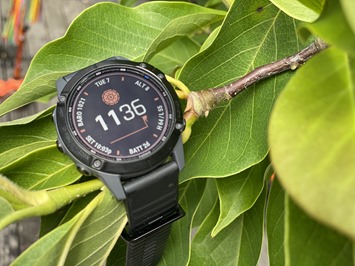
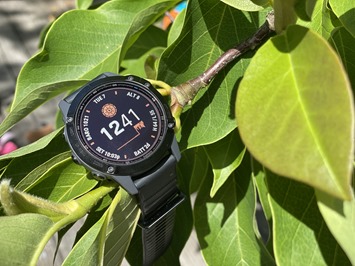
Of course, that’s likely not long enough – especially when balanced out by notifications coming in (but no GPS on). Certainly you can get a small increase in battery life from a number of hours outside as Garmin indicates. People have seen it. But my point here is expect it to be somewhat minimal.
Compare this with something like the Casio GBD-H1000 GPS, which can easily power up from dead to not dead using just solar panel in a relatively short amount of time (couple hours at most), and actually get sustainable solar power from the panels. Not enough to last forever doing GPS activities, but certainly plenty to meaningfully help when hanging outside on a sunny day not recording.
Of course, that’s a different beast of a watch, and the more I use it, the more I realize there’s really not much real-world overlap with either the Fenix 6 or Instinct. After all, it only has a single sport mode: Outdoor run, and no method to set any other mode. Plus, it’s clear that Casio isn’t trying to hide the solar panels, rather it becomes part of the aesthetic.
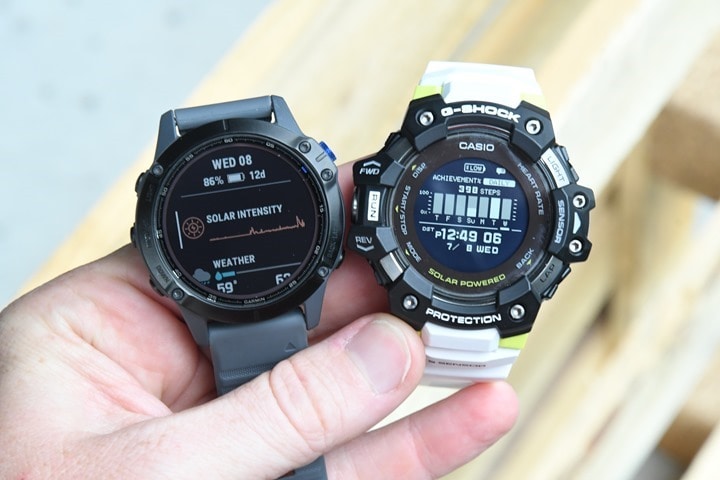
Whereas Garmin seems to aim to make it such that you’d never notice the panels if you didn’t explicitly know they were there, and where they were. Different strokes for different folks. But, at the same time, I’m hoping we’ll see more gains from Garmin in the future.
They did note that the Fenix 6/6S/6X Solar and Instinct Solar would all be considered from the same solar panel technology “generation”.
GPS Accuracy:
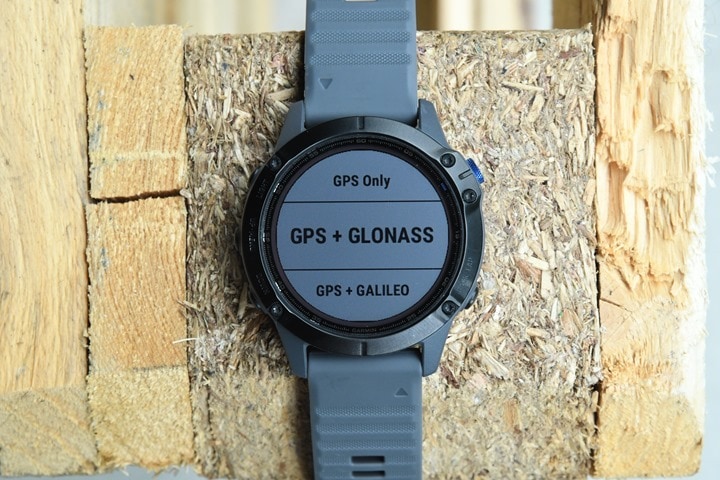
There’s likely no topic that stirs as much discussion and passion as GPS accuracy. A watch could fall apart and give you dire electrical shocks while doing so, but if it shows you on the wrong side of the road? Oh hell no, bring on the fury of the internet!
GPS accuracy can be looked at in a number of different ways, but I prefer to look at it using a number of devices in real-world scenarios across a vast number of activities. I use 2-6 other devices at once, trying to get a clear picture of how a given set of devices handles conditions on a certain day. Conditions include everything from tree/building cover to weather.
Over the years, I’ve continued to tweak my GPS testing methodology. For example, I try to not place two units next to each other on my wrists, as that can impact signal. If I do so, I’ll put a thin fabric spacer of about 1”/3cm between them (I didn’t do that on any of my Instinct activities however, all workouts only had a single device per wrist). But often I’ll simply carry other units by the straps, or attach them to the shoulder straps of my hydration backpack. Plus, wearing multiple watches on the same wrist is well known to impact optical HR accuracy.
Next, as noted, I use just my daily training routes. Using a single route over and over again isn’t really indicative of real-world conditions, it’s just indicative of one trail. The workouts you see here are just my normal daily workouts.
First up we’ll start with something relatively easy, my 10-mile hike yesterday. The goal of this was mostly to stay in open-air areas to get more solar power. Still, there was a wooded section the last mile or so. Here’s that data set. This set included a Polar Grit X, Garmin Instinct, Instinct Solar, Fenix 6 Pro, and Fenix 6 Pro Solar.
![image_thumb[9] image_thumb[9]](https://media.dcrainmaker.com/images/2020/07/image_thumb9_thumb.png)
For the first couple kilometers, all the units were basically identical. Again, there’s basically nothing out here to obstruct the GPS view:
![image_thumb[13] image_thumb[13]](https://media.dcrainmaker.com/images/2020/07/image_thumb13_thumb.png)
Then, I got to the beach area. Along the waterfront there are actually tall apartment/hotel buildings that I came relatively close too. But there was no meaningful impact to GPS accuracy on any of the units:
![image_thumb[15] image_thumb[15]](https://media.dcrainmaker.com/images/2020/07/image_thumb15_thumb.png)
Then it was off into the dunes for a bit. And again, all super boring here:
![image_thumb[17] image_thumb[17]](https://media.dcrainmaker.com/images/2020/07/image_thumb17_thumb.png)
As I got into the trees, I started seeing a tiny bit of variation between the units. But we’re basically talking 2-3 meters difference offset from the path. And it varied which units were most accurate. In general the two Instinct units seemed nearest the track most times. All units were configured with the same GPS+GLONASS.
![image_thumb[24] image_thumb[24]](https://media.dcrainmaker.com/images/2020/07/image_thumb24_thumb.png)
![image_thumb[25] image_thumb[25]](https://media.dcrainmaker.com/images/2020/07/image_thumb25_thumb.png)
However, I do want to briefly note that with about 100m to go, the Instinct Solar restarted randomly. It didn’t lose any GPS track data, and allowed me to resume. But it oddly added nearly about a mile (~1.5km) to the summary distance with no reason. It also added 15 minutes. Neither of these make any sense, and Garmin is looking into it. It didn’t impact the GPS track, but just the total value shown on the unit and in Garmin Connect.
![image_thumb[27] image_thumb[27]](https://media.dcrainmaker.com/images/2020/07/image_thumb27_thumb.png)
So ultimately, while GPS accuracy was pretty good, the restart gave me extra credit for no reason.
Next, we’ve got a more city-focused run, including going through some buildings. For this one I had with me an Instinct Solar, Casio GBD-1000, Polar Grit X, Fenix 6 Pro Solar, and Forerunner 935. Here’s that data set:
![image_thumb[29] image_thumb[29]](https://media.dcrainmaker.com/images/2020/07/image_thumb29_thumb.png)
The Casio oddly had GPS lock, showed GPS, started with GPS lock…but then decided against recording the first mile or so of GPS data to the file. I’m not sure why it was upset. You see it start mid-way through the run, above, in the middle of a pond.
In any event, zooming into the park portion first (which is mostly under tree cover this time of year), you’ll see that the Instinct Solar and Grit X were probably closest to the path on the southern side (but was a bit more wobbly on the northern side straightaway). The Fenix 6 Pro Solar was pretty darn smooth on both sides. The Casio seemed a bit drunk on the turns, but was mostly fine for the straightaways.
![image_thumb[31] image_thumb[31]](https://media.dcrainmaker.com/images/2020/07/image_thumb31_thumb.png)
Next, are some buildings. This included running down a street with 5-6 story buildings on both sides (shown at left below). The Garmin/Polar units nailed this, spot on. The Casio…went shopping. Also, for those curious – the Casio was on my right wrist, and the Instinct Solar on my left wrist. The other units were all on the handlebar of the running stroller.
![image_thumb[33] image_thumb[33]](https://media.dcrainmaker.com/images/2020/07/image_thumb33_thumb.png)
Also of note above is that I went through the Rijksmuseum, and most of the watches were pretty good at that. It’s probably 100-125m long of no GPS signal under a massive building. The Instinct Solar slightly cut the corner towards the end, but otherwise it was reasonably clean.
This next section I ran twice, so it looks a bit crowded, but it’s good to see how similar each unit was since I ran in the same spot each time. You see the Casio and FR935 are more variable, whereas the Fenix 6 Pro Solar, Polar Grit X, and Instinct Solar tended to be less variable.
![image_thumb[35] image_thumb[35]](https://media.dcrainmaker.com/images/2020/07/image_thumb35_thumb.png)
Finally, for summary stats, you can see those below. Note that the Casio doesn’t write the summary data to a file…because it actually doesn’t write any files. Instead, you have to download a file from Strava, and that file doesn’t include the summary data properly written (because Casio doesn’t send it).
![image_thumb[37] image_thumb[37]](https://media.dcrainmaker.com/images/2020/07/image_thumb37_thumb.png)
I’ve done piles more workouts with the Fenix 6 Pro Solar since early June. In fact, almost every workout you see on Strava since then has been with the Fenix 6 Pro Solar. Rides, runs, hikes, stand-up paddleboarding both in the forest and city – all that unit. For example, here’s a paddle with it around Amsterdam. You’ll see one spot where the two lines separate on the northwestern edge. In that case, it’s because I had my board atop my wrist as I was portaging across a non-connecting canal. Whereas the Fenix 6 Pro (non-Solar) could see the sky, so the track there is more accurate. But that’s pretty reasonable.

In any case, I just don’t see any meaningful difference between the Solar variant of the Fenix 6 Pro and the non-Solar variant. Which is to say that, for most people in most situations, GPS accuracy will be just fine. Like with other watches, you’ll still see variations. Given all Garmin/Suunto/Polar/COROS units are using the same GPS chipset series from Sony, the accuracy tends to be pretty similar.
Wrap-Up:
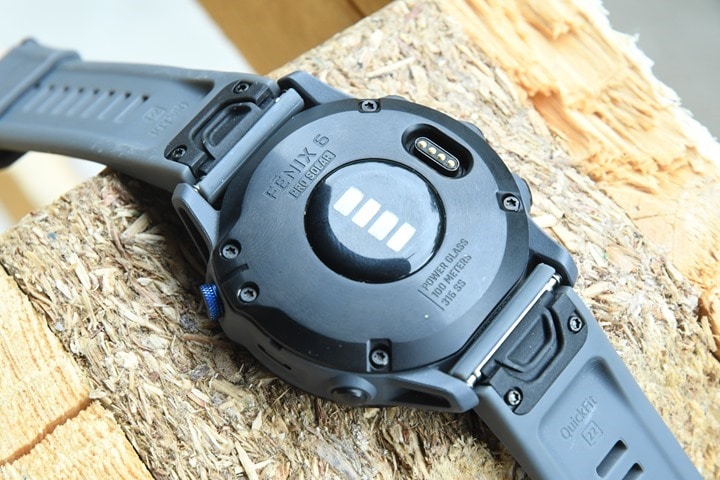
After releasing the Fenix 6X Solar last summer, demand exceeded supply. And perhaps more challenging for Garmin, supply didn’t meet expectations. The company struggled through a fair chunk of Fall 2019 with yield related to the solar panel technologies. After all, it was their first watch incorporating the tech, and they needed to sort out the manufacturing side of things. But now, nearly a year later they’ve clearly done that. Supply is ample for the Fenix 6X Solar, and since then they’ve rolled out a Quatix edition watch with Solar, and now nearly a dozen Instinct Solar variants and a wide swath of Fenix 6S Pro and 6 Pro solar variants. Clearly, they’ve found their groove on this solar thing.
However, with the Fenix 6/6S/6X Pro Solar editions specifically, it’s hard to really see the benefit of solar in day to day situations. Sure, on bright sunny summer days with 8-10 hours of strong sunlight outdoor time you’ll definitely see a benefit. But, for the rest of the year, you probably won’t benefit much. And that’s somewhat to do with the fact that the Garmin Fenix series mostly tries to hide the solar panel. Compare that to the new Instinct Solar which uses vastly more solar panel within the display to get nearly a 30% bump in GPS on-time, and an ‘Unlimited Power’ type mode in a battery-saving watch mode. I’d really like to see Garmin push the boundaries a bit more with the Fenix series.
Still – if you want the solar tech in a 6 or 6S form factor – it’s here now, and ready to roll. And, for everyone else that already has a Fenix 6 series, then you’ll benefit from all the new surf/sleep/climbing/bouldering features. So, seems to be win-win for now.
With that – thanks for reading!
Found This Post Useful? Support The Site!
Hopefully you found this review/post useful. At the end of the day, I’m an athlete just like you looking for the most detail possible on a new purchase – so my review is written from the standpoint of how I used the device. The reviews generally take a lot of hours to put together, so it’s a fair bit of work (and labor of love). As you probably noticed by looking below, I also take time to answer all the questions posted in the comments – and there’s quite a bit of detail in there as well.
If you're shopping for the Garmin Fenix 6 Pro Solar Series or any other accessory items, please consider using the affiliate links below! As an Amazon Associate I earn from qualifying purchases. It doesn’t cost you anything extra, but your purchases help support this website a lot.
Here's a few other variants or sibling products that are worth considering:
And finally, here’s a handy list of accessories that work well with this unit (and some that I showed in the review). Given the unit pairs with ANT+ & Bluetooth Smart sensors, you can use just about anything though.
This wifi-connected scale will track your weight and related metrics both on the scale display and in Garmin Connect (plus 3rd party apps like TrainingPeaks). It'll also then sync your weight to your watch/bike computer, to ensure accurate calorie data.
This is a dual ANT+/Bluetooth Smart cycling cadence sensor that you strap to your crank arm, but also does dual Bluetooth Smart, so you can pair it both to Zwift and another Bluetooth Smart app at once if you want.
Seriously, this will change your life. $9 for a two-pack of these puck Garmin chargers that stay put and stay connected. One for the office, one for your bedside, another for your bag, and one for your dog's house. Just in case.
These are one of my favorite power meters, due to both cost and accuracy. These have mostly become my defacto gravel pedals, and also get used on a lot of other comparison testing.
The Garmin Rally series is effectively 3 power meters in one, for three pedal types. I use these often in accuracy testing. While they're a bit more expensive than the Favero pedals, they offer the ability to swap pedal types easily.
The HRM-PRO Plus is Garmin's top-end chest strap. It transmits dual ANT+/Bluetooth Smart, but also transmits Running Dynamics & Running Pace/Distance metrics, stores HR data during a swim, and can be used without a watch for other sports. Also, it can transmit XC Skiing Dynamics as well.
And of course – you can always sign-up to be a DCR Supporter! That gets you an ad-free DCR, access to the DCR Quarantine Corner video series packed with behind the scenes tidbits...and it also makes you awesome. And being awesome is what it’s all about!
Thanks for reading! And as always, feel free to post comments or questions in the comments section below, I’ll be happy to try and answer them as quickly as possible. And lastly, if you felt this review was useful – I always appreciate feedback in the comments below. Thanks!



















































![image_thumb[9] image_thumb[9]](https://media.dcrainmaker.com/images/2020/07/image_thumb9_thumb.png)
![image_thumb[13] image_thumb[13]](https://media.dcrainmaker.com/images/2020/07/image_thumb13_thumb.png)
![image_thumb[15] image_thumb[15]](https://media.dcrainmaker.com/images/2020/07/image_thumb15_thumb.png)
![image_thumb[17] image_thumb[17]](https://media.dcrainmaker.com/images/2020/07/image_thumb17_thumb.png)
![image_thumb[24] image_thumb[24]](https://media.dcrainmaker.com/images/2020/07/image_thumb24_thumb.png)
![image_thumb[25] image_thumb[25]](https://media.dcrainmaker.com/images/2020/07/image_thumb25_thumb.png)
![image_thumb[27] image_thumb[27]](https://media.dcrainmaker.com/images/2020/07/image_thumb27_thumb.png)
![image_thumb[29] image_thumb[29]](https://media.dcrainmaker.com/images/2020/07/image_thumb29_thumb.png)
![image_thumb[31] image_thumb[31]](https://media.dcrainmaker.com/images/2020/07/image_thumb31_thumb.png)
![image_thumb[33] image_thumb[33]](https://media.dcrainmaker.com/images/2020/07/image_thumb33_thumb.png)
![image_thumb[35] image_thumb[35]](https://media.dcrainmaker.com/images/2020/07/image_thumb35_thumb.png)
![image_thumb[37] image_thumb[37]](https://media.dcrainmaker.com/images/2020/07/image_thumb37_thumb.png)


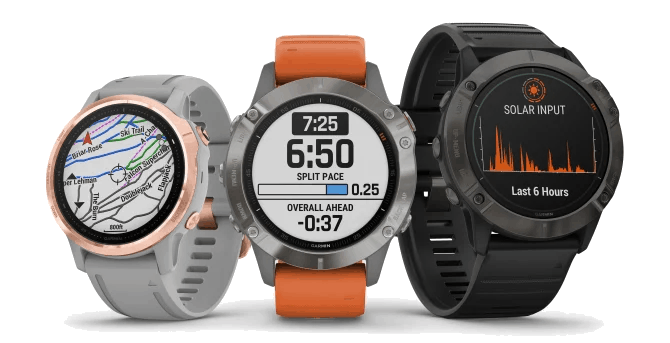
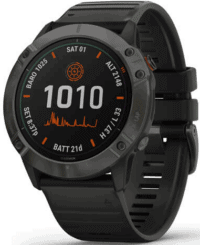
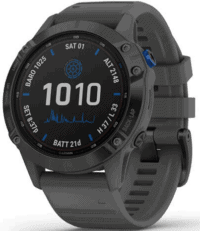
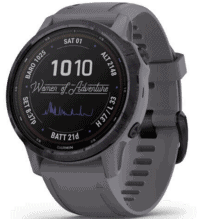
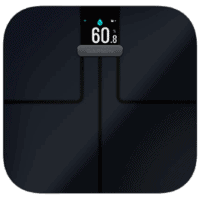
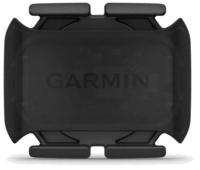
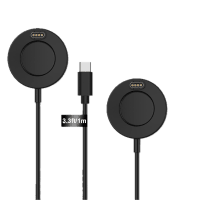

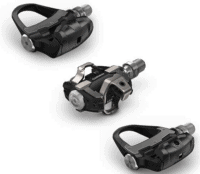
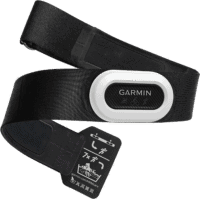












Did I miss something?
Can’t see any mention of price/cost?
Ahh, it was set to go into the comparison charts, but just rounding those up now.
$849 for both Fenix 6S Pro Solar and Fenix 6 Pro Solar. There are swankier band options that cost more.
Wait what? That’s iPad Pro money.
If someone spends that much on a watch, they’re a sucker.
That’s right Dan.
Garmin tries to keep adding “features” to justify the high price. Whether those features actually work is not their concern. These sun charging features have 0 (zero) effect on batterylife in normal daily circumstances.
But people actually buy these expensive watches and bloggers love to write about them. So everybody is happy, except a hand full of people who dare to ask, WTF??
When it was still sunny, I did an experiment and just walked in the sun giving my Garmin as much sun as it could get. Not recording an activity, just regular watch mode. Result – +1% for every hour spent in the bright sunlight. I’d say it’s a visible effect.
Inversely – why is an iPad Pro worth that much? There’s plenty of other computing options that meet the needs of 95%+ of the population just fine for far less.
I’m pretty clear in this post that I think the solar additive on the Fenix 6 series doesn’t really net much. Maybe you didn’t read that (or any of it)? Literally, my entire summary section says ‘There’s no point’, with what is basically three paragraphs of ‘Shrug’.
I write about what people want to know more about. I don’t typically have any ‘love’ for writing about any particular thing, save pizza. I also write about plenty of things that the view numbers/interest frankly don’t support (far too low), but do so simply to show others there are other options out there.
However, I do think in the case of the Instinct the solar power is quite substantial. Whether or not people actually need that battery life? Probably not (just like probably not on the COROS watch battery life). But for someone that does need it – then it’s the right solution. Just like for someone that really needs an iPad Pro for something, it’s the right solution.
@Pavel. So if you pay attention and in specific situation you gain 1% per hour? Sorry, I keep my claim that there is zero advantage in normal daily use.
@Ray. Sure you love writing about gadgets. I didn’t mean it as something negative. And there is more to say about expensive ones than cheap ones (most of the time)
And do people really need expensive versions of watches/tablet or really want them. I think a bit more want than need.
I really value batterylife. Not because I run for 24 hours in a row, but because I don’t want to charge my watch every few days. Or worse: have to first charge before I can go out. To bad you have to buy the most expensive option to have great Batterylife. Would love a forerunner 245 with the batterylife of a 945. But my 935 will do for some more years. Haven’t seen any new interesting features.
If you pay attention, you would notice that 1% increase. If you don’t – it will happen anyway, even when you don’t pay attention. I checked the battery stats exactly two times – before I walked outside and after I got home
The point I was trying to make is that it just works – you just walk outside and your watch is charged bit by bit. More when it’s bright and sunny, way less when it’s clouded, not at all when it’s dark – as with any other solar battery on the market. You don’t need to position your watch in a certain way.
Of course, if I would go on a hiking trip, I would either bring a normal solar battery that I can strap to a backpack or a power bank (or both) to recharge the watch.
Garmin should look to the watch band. There’s a lot more area, points in different directions, and putting power contacts into the watch will be trivial. Collection area is what counts, since efficiency is probably not going to increase that much. No one cares if their watch band is covered with solar cells; everyone cares if they can’t see the watch face.
Thank this post made me realize how stupid a 200 dollar upgrade is for a solar panel that does absolutely nothing. My 200 dollar gshock rise man from 10 years ago was well worth it compared to this.
Might wait until the garmin 6 pro reached sub 450 since it is a glorified pebble watch.
So should I be using GPS+GLONASS or GPS+GALILEO? Have you done any comparison on accuracy and battery consumption?
It’s tricky. I’ve tried a lot, and half the time it’s mixed and the other half the time well…I just don’t even know.
Up until the Sony chipsets, I’d seen really good results with the FR935 and Galileo. Like, the best GPS accuracy I’ve ever seen. Then with the Sony GPS chipsets and Galileo, it was blah. Not horrible, but not great. At the time Garmin has said they were focusing on GPS+GLONASS in terms of optimizations on the Sony chipsets, before moving towards optimizations for Galileo. Mostly because back 17 months ago, the Galileo constellation had just barely reached operational status. So it kinda made sense.
Right now, I’d probably recommend GPS+GLONASS for newer Sony-equipped devices, but for stuff with MediaTek I’m personally finding Galileo to work well for me (even with about a 10% hit on battery).
The lost distance/ low avg pace I get from my Fenix 6 pro, vs my out going Apple Watch no less, is my main disappointment and is pushing my towards the Stryd just to get good pace and distance. I run a lot in the trees, frustrating to have to spend £200 to get something you’d think is basic!
Cheers, I appreciate the well informed reply.
I’ll stick to the GPS+GLONASS combination on my Edge 830 and Fenix 6 Pro then.
Honestly getting a Stryd was a revelation for me. I bought it for power but hardly look at that these days, I just love the metre-perfect distance accuracy.
Any updates on this? In other words, any benefit of one of GLONASS vs Galileo over the other at this point?
In the Edge devices, it would be so perfect. :)
+1
My thoughts exactly: put the frugal 830/1030+ chips in an Edge 1000 case and blanket that huge bezel area with this solar stuff. (or a Roam bezel if you want to get cheeky)
Was coming here to say this. Hopefully coming soon.
Appears to be a $150 adder on the Fenix 6? I thought it was less on the 6X at launch, but maybe I’m mistaken…
Especially after the $150 sale a few weeks back (making it a virtual $300 difference to recent prices although the sale has ended) given the lackluster improvement in battery and no notable other enhancements this just feels like a non-starter for me personally.
Cool overall tech though.
Hi Garmin- If you’re going to add a feature to a year old watch, along with hundreds to the msrp, cellular would go over much better than this rather useless addition.
Pat…
That may be beneficial to you but there also lots of people (like me) that don’t want to sacrifice battery life in a HUGE way to have that connectivity.
Maybe if it only somehow turned on during an activity during incident detection or assistance modes, that might be helpful. But look at watches with cellular connectivity and what their batteries get.
For me, solar is more appealing. I still don’t think it is 100 percent ready for mainstream. But if Garmin continues to improve here, then they are on to something for us that want long battery life for this adventure oriented watch.
Apart from being a huge battery-drainer, cellular is also not that wide-used – there are plenty of countries where cellular-enabled watches are not sold because the regulations are not there yet, so it would be making an expensive product that could be bought by a part of people it’s aimed at.
Maps updated? No need to install even more detailed maps you think?
Probably on comparison charts but: no Sapphire solar I assume?
Also interested in which GPS combo / setting seems “best” (asked above).
Nice job!!!
Sadly no global maps like new Edge 1030 Plus. I suppose at least it’s semi-cheaper now at $19 (or free with my usual instructions).
Correct, no Sapphire.
And yup – I’ll cover the GPS settings in earlier question above in a moment…
Do you think new activities (bouldering/climbing) might trickle down to older Fenix 5/Forerunner 935 ?
No, I doubt it unfortunately. :(
In early March, we rented a car for two days during our visit and drove 2/3rds of that hike loop. There were reindeer just hanging out in Zandvoort!
Nothing to do with a Fenix 6, but I was wearing my FR230.
It’s funny, while in the on that loop yesterday I saw the sign for the reindeer near some houses and was kinda like: Ummm?
Deer, but not reindeer. Greetings from Finland;)
For Zandvoort it’s actually not that uncommon to see deers
Luckily I’m not too interested in solar (got a Fenix 6 pro 2 weeks ago), but I do want to know when that firmware undate is coming to the existing line up! Any news?
Thanks Ray!
The third paragraph of the “What’s new” section states:
> “Oh –and just in case you missed it above: Yes, all those new software features are coming to the Fenix 6 series in the next firmware update.”
You can grab the beta already, here: https://forums.garmin.com/outdoor-recreation/outdoor-recreation/f/fenix-6-series/231647/fenix-6-series—10-00-beta-release-candidate
It includes Bouldering/Indoor Climbing/Surf.
Given that was specifically marked as the release candidate, my guess is any day now it’ll switch to production.
Any idea when they’re going to roll that out for the 945? They seemed to pause updates a couple months ago.
Thanks, Ray! A couple of observations:
– Great to see solar moving to the 6 Pro. That said, a bit underwhelming compared to the 5 to 5 Plus update (which added Pulse Ox, Galileo, ClimbPro, Music, and Garmin Pay). MTB Grit/Flow was already on my F6 Pro
– As an F6 Pro Sapphire owner, disappointed to see neither DLC nor Sapphire offered with Solar (Tactix Delta Solar comes with Power Sapphire glass)
– To my eye, the area with 100% PV capture could be at least doubled if the current area with hash markings/number around the perimeter were also used for PV. Maybe for F7?
DLC is offered on one of the Fenix 6 Pro Solar SKU’s, with a titanium DLC band.
I agree on the PV layer. I think they’re being too cautious here. In fact, in looking at the 6X Pro Solar and 6 Pro Solar side by side while taking pictures, I think the 6 Pro Solar looks just a tiny bit wider for that 100% layer. I don’t have a good way of measuring that given it’s only 1mm, but my understanding from e-mails was they were supposed to be the same width. I’ll re-confirm.
It might be an optical illusion based on the black edge area of the 6X seeming to ‘hang’ over the PV layer.
Yeah, I missed the Titanium DLC version but that’s quite a bit pricier!
One detail you didn’t mention is the knurled finish around the start button, which isn’t even on the Tactix (would have thought it would have it before a Fenix)!
I just ordered an F6 Pro and will receive it on Monday. Was initially shocked by the announcement but it appears the only real difference is the solar tech (and more colorways/slightly different buttons) which I have no real use for as I use the watch mostly indoors and live where summers are short and winters are long and dark. As the F6 Pro Solar seems to cost 100-150 more than the F6 Pro w/o Solar, I’m going to stick with my purchase decision as I did not even want to pay that amount of extra money for the Sapphire version (with its slightly worse readibility).
Any chance to see solar panel on garmin edge soon ? Would be great !
The solar seems marginally useful in terms of generating power, but I wonder if you could leverage it as a solar exposure widget, to generate reminders to re-apply sun screen or something?
Now they have a solar function – is that connect to a health function like the UV index.
Be aware you have had to much sun today – or something like that.
Based on the power, the time, the location ´, the UV-index – you should be able to put up such algorithm.
Just got a Fenix 6 Pro. So I am kind of happy to see all new features coming to that version. I am using the F6 alongside an Apple Watch (mostly for sports use). Unfortunately both watches are not playing very well together. Active Calories for example from Garmin Connect are not pushed into Health. Problem seems to be the source order. Every time I change it manually to give the preference to Garmin, Apple is automatically pushing the Apple Watch back on top. Right now I have to use Strava to get the active calories working. Anybody else experiencing those problems?
Are you recording activities on both simultaneously? I wear my Apple Watch (5LTE) when riding but I never use it to record, I record exclusively on my Edge 830. Looking at Health on my iPhone, today’s numbers don’t seem off, but I do use Strava as a source (and Garmin’s Connect app as well). (Although “Activity” and “Active Energy” show substantially different numbers.) Calorie burn seems to be in line with what actually happened. I only noticed recently that the Apple Watch stops sampling HR when I’m actively riding (which explains the ridiculous HR numbers it gives for summaries and the like). But if you’re recording with both, then of course I’d expect Apple to prioritize the numbers from the AW. Better to just record on the 6 and let Strava take care of things. Better yet, ignore Health, since it doesn’t really seem up to it.
No, just using the Fenix for the activities. Problem is, that the Fenix is adding all active calories throughout the day into one sum and then writing that into Health with the sync time stamp (which is not the timeframe the workout happened). Since the AW is writing calorie data constantly while wearing, it will take the top spot and the Garmin data is not counting.. Found no way around that other than using Strava for writing the data.
I am guessing that this is the Fenix update for this year? So no further updates e.g. there will not be a plus model expected this year as there was for the 5 do you think?
My plan was going to hold out for the next gen of the Fenix before upgrading my dear old Fenix 3hr… But if they just released this hardware adder to the 6 line, maybe it’s going to be another year for the Fenix “7”? Shucks.
The thing which I think you gloss over a bit is gps accuracy on the Fenix watches. A lot of people unfortunately don’t live near mountains where you will get good uninterrupted signal. A lot of people live in cities with buildings and I have found the fenix’s pretty unreliable. When running on the banks of the river Thames (View of sky but buildings nearby) it constantly zig zags and puts you in the river (when the runs are usually smoother and nowhere near the river) my tomtom spark 3 which is a much older and more basic watch gets it much more accurate with minimal zigzagging and runs in the water. Likewise running a 5km in my garden with my fenix which only has a one story level on one side of the garden has me running half way through the house and through the wall into the street most laps making it very frustrating and almost useless. With Covid and staying at home I have been running a lot on the treadmill and can say the fenix’s are the most unreliable watches for the treadmill, no matter how many times I fix the km’s afterwards. My old Polar’s and Tom toms are much more accurate and consistent on the treadmills. On paper the fenix is the best watch but it gets the basics horribly wrong which you don’t seem to report on.
I literally included running through a building in my GPS accuracy section. Like, inside a building and outside the other end. I didn’t include any mountains here (I wish).
As for your treadmill – actually, that’s easily explained. When you ran around your garden, you’re basically telling your Fenix to use that (bad) GPS data to calibrate the accelerometer for running on a treadmill. As such, it’s going to be pretty horrific.
Ultimately, most GPS units struggle in dense downtown environments. I can pull up countless runs from cities where things fail (including showing them in my reviews). NYC, London, Paris, Dubai – all have been featured in my reviews, to varying degrees of success.
When it comes to much older watches, they use GPS chipsets which are far more power hungry. Sometimes that results in better GPS accuracy (though, not as much as people think they do, as I’ve also recently shown). But it mostly just means battery life is really poor.
Here’s where I went back and looked at GPS accuracy in NYC’s Manhattan over a decade’s worth of runs: link to dcrainmaker.com
Thanks, I will look at those charts. Sorry maybe I should have rather said I don’t feel you highlight this enough as it is the bread and butter of the watch. I still think after having a few models of fenix they should have improved the treadmill mode. On my old Polar’s and tomtom’s after calibrating the distance they used to be fairly close to the treadmill readings. With my fenix it is wildly different, up to 2kms difference for a 55min run. I don’t expect them to nail it perfectly but I would expect by now they would have improved the accuracy. Likewise if you look on the many forums it seems from version to version there still are so many complaints about running in suburbs With trees and cities where a few years old Tom tom’s had much better accuracy. I accept yours point about power usage but personally I would take a few hours less battery life for more accurate gps readings. Perhaps a setting for that in the future.
My Fenix 6 Pro is spot on when cycling but when running I almost always have a track that is shifted to the left of where I actually ran even when running in fields. It is often 10m or more. There was a whole discussion about in on the Garmin forums with people getting better results wearing the watch on the right or inside of the left wrist: link to forums.garmin.com.
I get there can be places with bad reception but the issue does seem to be related to running with the watch as on the same roads the bike route is mostly extremely good for me.
Thanks, that’s interesting, I have read other forums as well where people have been complaining since the 5. It has been a problem since the fenix 5 and the 6 still has it. I love the fenix range but it’s disappointing that 2 versions later and probably with this being 3 versions it’s still a problem with gps running accuracy which is the bread and butter of the watch for most people imo. This is a premium watch and yet older more basic gps watches I have used are a fair bit more accurate. The treadmill accuracy is also disappointing compared to watches up to 5 years older than this. I really hope garmin read the many forums and fix this as hardware wise they are a step above the rest.
My guess would be that if you did a proper treadmill calibration routine (either outside without buildings nearby, or indoors on the treadmill), it’d probably be pretty close.
Ultimately, every GPS has their issues with accuracy. Some more than others. However, most companies don’t host their own forums where people talk about them.
Ha well no need for my ciq Boulder app anymore I guess :-/
Is the 945 getting any of the new metrics? Especially on device sleep? Also would the grit and flow metrics work better if strapped to the handlebars?
One of the first times I’m not mad I just bought the old version (Fenix 6s Pro)! I live in Belgium and work indoor so not much in it for me!
But Ray do u think the Fenix 7 will come out this summer or will they wait another year?
HI Ray,
i found this review usefull not because i’m interested in the solar function of the fenix but because i suppose that we won’t see a fenix 7 in 2020. am i wrong?
I’m going to buy a new garmin for triathlon (main focus on ironman distance) so i m waiting for a fenix 7 or the ‘rumored’ forerunner 955.
So now i think only the 955 could be presented in 2020…
Generally/historically speaking Garmin operates on a 14-16 month sliding window for Fenix series releases. I don’t see the Fenix 6S & 6 Pro Solar editions as a new model in any way. It’s more akin to a new color.
Realistically, more product timelines are hosed up this year due to COVID, so it’s incredibly hard to say based on historicals. Companies are getting their groove back, but most products from most companies I review, are delayed by 2-6 months.
As for other rumors, they’re better at driving clicks than reality. But I can’t imagine a FR955 this year, Garmin operates their Forerunner lineup on a 2-3 year refresh cycle. and it’s barely been over a year. Not to mention, there’s realistically no competition for the FR945 at this point, so there’s no reason to rush out something.
I agree Ray that this is only a fenix 6 but don’t you think that it would not be smart to present this “new” fenix if they are going to present something called “7” in 2020 (with or without covid emergency)?
Reallllllllly hoping one of these days to see a descent MK2 review. My Fenix 5 is chugging along well enough to keep it given my current level of fitness / exercise, but I would probably spring for an updated garmin diving watch pretty quickly…
955 and 955 LTE might be coming this fall looking at FCC listings (link to fccid.io).
Not 100% sure though it’s 955 series but since those codes were leaked last year in the APK it most likely is since it also showed the Fenix 6 Solar in there.
Great find! Where did you note the 955 listing? I just see a master list of filings. Thanks!
If you scroll down you see several applications were submitted on 7/14. E.g. link to fccid.io. 955 and 955 LTE codes were found in the APK but there were few other codes in Garmin’s APK like 745:
”FORERUNNER_955”
“FORERUNNER_955_LTE”
“FORERUNNER_745”
I could imagine 955 would simply be 1.3″ screen with new power modes to catch up. But probably without solar since it’s not in the name.
To clarify, you won’t find any codes in the applications. But most likely these 2 new smartwatches could be 755 and 755 LTE. Haven’t checked if there’s a test for LTE in those sublinks. That would confirm it.
Oops meant 955. But 745 is possible as well.
This is such big news (IMO). A 735 to 755 would be great since the 645 is lacking some components (no BB, old HR sensor). And a new 945 this soon seems crazy fast. Hope to see more later!
Do you have any special settings to get such battery life during activities?
The last few months the battery consumption on my Fenix 6 Pro seems to be a lot higher than before.
I thought I was imagining things so I checked the battery percentage before and after a short run and the usage was 3% in 30 minutes. That’s less than half the quoted GPS time in the battery life chart which I did get approximately in the first few months and was very happy with.
I’m using GPS+GLONASS, 1-second recording, no PulseOx, and generally with optical HR on (for the field test, I instead connected all units to a single chest strap, so as to make all units equal from a testing standpoint). All were connected to a phone, and both Garmin Fenix units were actually concurrently doing LiveTrack too.
Things that I don’t tend to use much are:
– Connect IQ apps (which *can* dramatically impact battery life)
– Music
– Backlight isn’t set to always-on, but the usual 8-second timeout.
Cheers.
Thanks, reading your post reminded me about the backlight settings I changed during the winter to be always on during activity after sunset. I checked the settings and the alerts setting was set to on instead of after sunset which resulted in the backlight being always on for activities, even during the day. Of course in daylight I never noticed the backlight was on so let’s hope changing this setting to after sunset will increase the battery life drastically.
Do you know if there is an option to change the backlight settings per activity?
What I would want is to have the backlight always on when kayaking after sunset so I can see the timer (my watch is in front of me on the boat) . But when running I prefer the 8-second timeout.
Yeah, that often gets me coming out of winter too.
Its a system-wide setting – though you can technically tweak a few backlight enablement settings in power manager, but honestly that’s sorta using a hammer to solve the problem (and realistically, won’t solve what you want).
On the Garmin Edge devices, there’s actually a ‘Yo stupid, your backlight is on full blast and it’s sunny out’ type message that comes up. That came as a result of Garmin getting tired of people calling support saying their Edge was getting 2hrs of battery life. So then they added logging to the firmware, and within that Garmin support can see (if you send them a file) exactly what your backlight was doing. After a bit of that data, support was like ‘Yo, everyone keeps their backlight on forever.’, and thus, the alert was born.
Technically it says something nicer, but the gist of it is: Yo, idiot.
(Note: I say this as someone who is always in the wrong backlight setting on my Edge)
Just leave the Edge backlight permanently on auto: it will be completely off in daylight, ramp up considerably in twilight when it has to compete with the remaining sunlight and then dim back down to a very low setting in absolute darkness where a setting appropriate for twilight would not only be wasteful but also blinding.
In a perfect world you’d additionally tweak the curves separately for data pages that don’t need much backlight to be legible and the map page where you can hardly ever have enough backlight blast. Perhaps Garmin already does this, I don’t know.
Seems changing the setting didn’t improve my battery life that much.
How do you get the battery usage in the fit file?
Are you using a datafield for that or is it on by default for the Fenix?
Battery information is recorded to all Garmin devices in the .FIT file (and Wahoo, and Stages, and a few others). Within the DCR Analyzer you can drag any .FIT file into the Analyzer and it’ll plot the recorded battery times. link to dcrainmaker.com
Cheers!
I live in Seattle. You’re pulling my leg with this “sun” business, right?
I grew up in Seattle.
Typically speaking you’ll see it the last few days of July for a couple hours. Cherish it!
There is also a Power Sapphire glass version available only in the also just released tactix Delta Solar Edition. (Which is pretty much a special trim level of the fēnix 6X.)
I’m glad that Garmin is investing in solar technology and seems serious about bringing it to market. This first generation hardly seems to generate enough power to be useful outside of the cool factor. The Power Manager features have a much higher impact on burn time than the solar.
Garmin quotes 10% extra burn time presumably in pretty ideal conditions which for the 6X is 6 hours in 2.5 days best case according to Garmin is not exciting. The implication of a 0.08% difference in a Ray’s real world test is 5 minutes in 2.5 days if it were daylight 24 hours a day.
Solar glass needs to get a whole lot better to be a really exciting and practical feature.
When I seen the email today I thought great, it’s finally here, but then realised it wasn’t, I’m wanting to upgrade my Fenix 5, and was hoping for the Fenix 7, but usually when I buy something, a new version normally arrived within weeks, I’m still torn, do I hang fire and wait, or buy the 6 now?
Thanks Ray
Any idea why they didn’t add solar to the recent Edge 1030?
I suspect at this point that the battery capacity fulfillment (I’m too lazy to look-up the exact mAh), is so big relative to the solar charging throughput that it probably doesn’t contribute anything meaningful yet.
But just a guess.
Garmin mentioned “new metrics for cross-country skiing and mountain biking. And keep a close eye on your training progress with improved performance monitoring, including trail run-specific VO2 max, the acclimation 2.0 widget and an ultrarun rest timer” in a post at their forums:
https://forums.garmin.com/outdoor-recreation/outdoor-recreation/f/fenix-6-series/232469/fenix-6-pro-solar-series—product-announcement
Any ideas what these are?
They’re what happens when someone forgets the update the press release with items that didn’t quite make the cut for announcement day. Stay tuned…
Hi Ray,
do you have any news regarding trail run-specific VO2 max, the acclimation 2.0 widget and an ultrarun rest timer ?
Thanks
M
Nuttin…yet.
Are these all the Garmin announcements for now?
Joking aside, it’s interesting that you can go back historically and see how much sun you got any/every day. I bet that can help people with seasonal affective disorder better understand their needs. You showed a page in the Connect app showing sun exposure through the day, is there a longer term view too, like how you can see your HR over 24 hours or the min/max for a week?
No, it looks like it’s on a per day basis.
Btw – to access this, it’s actually under device settings, not general stats. So in GCM: More…, then Garmin Devices, then your solar watch, then Solar Intensity.
Thanks! ?
Ray, do you have any knowledge about the future of FR945 ? 935 seemed to be a lighter Fenix 5. 945 started as a lighter F6 but now seems to have been abandoned. Many bugs were fixed for Fenix 6 and not for 945. Does the new line of F6 mean Garmin won’t care about 945 any more?
What bugs do you feel the 945 has?
Planned FORERUNNER 945 LTE
Hi, It seems some links above don’t work. I tried to get Garmin cadence sensor and thought I would be redirected to Amazon and you would get some cash, points, etc. ….not sure how this works….
Jarek
Hmm, that’s odd.
Any chance your Amazon shipping address shows outside the US and is redirecting you to another Amazon international store?
Hey Ray, Do you happen to know if the Surfline Sessions requires a premium Surfline account? I can’t find that information on their website. I’m a tiny bit interested in trying that out. But not sure if I’m $800+ interested.
I don’t know. Information is super…slim….on the whole Surfline thing right now. :-/
Well it’s listed as a feature of their premium subscription on this page: link to surfline.com
Do you think Garmin will bring this technology to the Edge computers?
Hi
I want a watch with solar but for militray use .
Which is best for me .?
Garmin 6 Pro Solar
Pls advice
Thanks a lot
my guess would be that you should go with the new Instinct Solar Tactical edition (or the normal one for 50$ less)
Hey!
You always get the best gadgets first. BIG question for me a bunch of others – can you tell a difference in the blue-ish blacks or washed out backlight on the 6S screen for the Solar verses the 6S Pro or Standard? I would love love love a side by side comparison if possible.
A lot of people wrote in about the screens on the 6S being considerably washed out and having a hazy blue, versus some of the other models (to date about 50% of 6 Pros and almost all of the 6 Standards I have heard of have the washed out, and approximately 30% of the 6X). It helps to turn the backlight completely up to compare to another, or just look at 50% in a regularly lit room.
Any thoughts would be great! Thanks!
Yeah, it’s definitely a bit more washed out on the 6S Solar Pro.
I’ll stick together a photo today, but easily more washed out than the 6 Pro Solar.
Curses! I’ve wanted the 6S for a bit now over the 6 that is my comparison standard. Thanks for commenting!
Great review! Do you think the Surf Activity App will come to 945? Would love that.
Hi Ray, thanks for the detailed review!
A few questions about the screenshots:
1) do I understand correctly that Solar Data is still in Garmin Connect beta app and is not generally available?
2) For the power modes – if you create a custom power mode, can you select it to be the default power mode for a specific activity. For example, I’ve created a power mode which disables phone connectivity for outdoor workouts, but when I try to select it in activity configuration, it is set back to “Normal”. Is it a bug or a feature?
Hmm, I’ll have to check on prod vs beta, I’m pretty sure that one is prod.
Mine does the same on power modes. My guess is that’s a feature to keep people from getting in trouble.
can we accept fenix plus or sport this year?
can we accept suunto 10 this year?
Well i think 6XPro Solar was the public beta for the technology. and its trickled down. by adding it to the highest price model they have they had the money to replace/fix them if problems occured.
The instinct seems like a pleasant offering for most walkers/hikers etc but adding it to the already busy Fenix line up just feels a bit porsche. yeah its a porsche, unless you are ticking all the boxes you gonna feel like you are missing out and would have been better off and faster in an BMW M5.
From what i can see there is no reason to upgrade in a hurry and it will bring the price down on the non solar models pretty quickly as people will want to shed older stock. now ghey have added it to the tactix sapphire i will be watching the pricing on the non-solar tactix like a hawk :-)
Garmin keeps adding features… But one key feature is missing if you are doing interval training. Time remaining on step data field. Should not be so hard to add. It has been available on the Edge devices for ages. It is available on the standard interval page but one that page you cannot customize the fields…
Here is request to Garmin:
link to forums.garmin.com
If you DC could mention that to Garmin, maybe they would listen ?
But if you plan a training via Web / app – there will be remaining time field on the Interval screen. Even the link that you added shows that.
Yes, but I do not. Standard screen displays different number of screens depending on the targets you set on the workout. I cannot see what my power is if I do not set a power target for example.
surely a tactix?
Thought you would want to correct some issues: Grit and Flow, Climbing, and Bouldering have all been available for months on my Fenix 6 Pro without any beta software updates. I’m not sure why it shows up as a change in the beta software, but that has been the case.
Thanks – and yup – already changed it earlier this morning. And I agree, weird that they’re called out as a change in the beta software.
Nice review Ray, as usual!!!
So…, I suppose Garmin has two options here for the new FR945…
Add the solar panel in the thick black useless part of the FR945 actual version bezel, like it was done in the Instinct, which would increase battery life a lot more when comparing to the Fenix 6 – becoming a new beast in my opinion…
Or…, just make the display bigger like the Fenix 6 with the little line around the display for solar capabilities….
The first one for me would be best.
Any comment on how battery life “degrades” on these higher end Garmin watches? I have had 2 Vivoactive 3 watches which started life with 6 1/2 days of battery life and with no changes they fell to 1 day and 2 1/2 days respectively with no changes in average usage within one year.. Not using gps etc. no music, just basic smart functions and heartbeat recording).
Basically do these higher range models hold their battery strength better?
I bought my Fenix 3 HR four years ago, and the battery is still doing fairly well. I get well over a week of usage if I don’t use the GPS. Maybe 10 days, ish?
With the GPS tracking an activity I’ll get all day usage. Maybe 10-12 hours.
Normal usage plus a 30-45 min run per day, I’ll need to charge my watch a couple times a week.
My F3 seems to last 4-6 days still but I do not use the GPS much anymore as I do all indoor riding. My F2 is down to a few hours but it was completely discharged for quite a while.
I still think the 945 is the best watch they ever made and the rest is just nice to have. I wonder what the 955 will bring and when!
What is the big deal with the solar, my 15 year old Casio is still on it first battery using it inbuilt solar charger, what are the odds of a Garmin with it inbuilt life built in.
I dunno, what are the odds that your Casio can display maps, provide turn by turn navigation, pair with ANT+ and Bluetooth sensors, upload to Strava, pay at a contactless terminal? Pretty slim, I’d guess.
Do you think it’s possible to switch out the glass on the current Fenix 6 Pro for the new solar glass? That would be a nice benny if it were possible.
So I have funds in the bank. Do I buy a Fenix 6X Pro now or wait and see if prices come down with news of the new models?
Also, for general fitness, wearing a strap, is this device good enough for your average jogger, bike rider occasional hiker and swimmer.
I have always wanted one of these and it’s time my old garmin swim, FR620 and Edge 800 got replaced. Would probably buy another Edge at some point but for now hope the Fenix 6X Pro will be adequate.
Thoughts?
Hey Jamie-
Since I think you’re in the UK, I’d point out that as of this morning Amazon UK has the Fenix 6 series for upwards of 30% off as part of a day sale. The Pro models are 16% off, and some non-Pro are 30% off. Linkage here: link to amzn.to
Just in case that helps push your decision one way or another!
Cheers!
Does the clarity and visibility of the display differ between the solar version and non-solar version?
Not from what I’m seeing. There is however a different in color/clarity between the 6S and 6 (applicable to both Pro and Solar).
Thanks for the reply! Which has the better display, 6 or 6S?
The 6 variants are better (non-S). Here’s a quick set of two or three pics.
Here’s another. These are straight out of camera, and I’m noticing that as I post the first one, the WordPress compression for images is making them look darker than reality (for both). However, the key thing that you’re seeing it’s so much brightness, but the slight bit of washed-out-ness of the 6S, and it being slightly less crispy. You’d likely never notice it if you just picked up a 6S from the get-go, but if you had a 6 and went to a 6S, the first day you might notice. Then you’d forget about it.
And finally, one last image. And again, WordPress comments image compression is definitely making these unedited shoots look way darker. Sorry!
Great thanks Ray. Had a Fenix 2, now got a 5S, think will upgrade to the 6 Pro.
Great review. Your thoughts on if this is the only update to the Fenix 6 pro line-up for 2020?
I’m about to invest in one but would wait if there will updates to the line-up.
Cheers!
Not sure. Garmin typically operates on a 14-16 month or so schedule for the Fenix series refreshes, so last year was roughly Aug 30th I think. Meaning, that would put it towards the end of this year. Typically speaking no company releases new products after about mid-Oct, due to the Christmas buying cycle.
But realistically, with COVID-19, who knows anymore. Everything from every company in this sector has been delayed to some degree. So it’s really hard to predict what might or might not happen this year.
If they want the surf app tested they need to get it on the 945. There were several of us in that discussion, linked in the review, that use the SUP activity to track our surf sessions but have the 945. This is a much desired activity for those us that live by the coast. I surf several times per week and its annoying to change my activity from SUP to Surf in Strava.
Im Not Sure about the way to Go.
Fenix6….sleep from Firstbeat. But, Looks Like, a not good GPS Set.
FR245. Blind Spot Problem since ever. Not Firstbeatsleep
Instinct Solar. Good function. Uglyst Screen like a 5€ playwatch from the 80s for near 400€. No sleep from Firstbeat.
Anyone Amy ideas? Im talking about the Fenix 6 silver
Ray, do you see a lightweight version of a fenix 6 comming? A really sports version for runners and triathletes is still missing. The old designed 945 with the odd screen and missing features is no alternative.
What about trail run-specific VO2 max. Is this comming to the 945 and 245?
Michael
Hi everyone, hi Ray,
does anyone has an estimate, when the next significant update, i.e. the Fenix 7 is to be expected?
Thanks a lot for an educated guess!!
Hi Ray,
any informations available about the tactix Delta solar, which has a power saphir glas instead of the so far used power glas (Gorilla Glas)? Or is the Garmin homepage wrong?
If I take # of hours gained versus charged for the Pro 6 Solar I get these ratio’s:
Smartwatch: 2 * 24 hours / (14 * 24 * 3 hours solar) = 1.1
GPS mode: 4 hours / (36/24 * 3) = 0.9
Saver: 32 * 24 hours / (48 * 3) = 5.3
So for smartwatch & saver mode, in theory that’s more hours gained than charged, so wouldn’t that mean it should go indefinitely?
Never mind, stupid mistake to use 24 hour sunlight. But in theory if you had 4.5 hours of full sunlight the battery save should go on forever 4.5 x 5.3 = 1 day). Those conditions would be rare in most places but I could imagine turning it off and leaving it in the sun.
Great review! Do you notice if the backlight on the 6 solar has any of the issues that some of the previous Fenix 6 pro/sapphire units have (blue/purple-ish tint, washed-out colors)?
I haven’t seen that on these units, or honestly on my previous one. For the 6S however, you’ll see slightly less crispiness than the regular 6/6X.
Hi Ray, i’ve been reading your reports for over 10 years! Thanks for that! Now a question: is that a new Fenix 6s Pro Solar in white silver? I cannot find this version in the Garminshop?
Yeah, it’s officially called: Champagne/Sandstone
Also officially called Light Gold with Light Sand Band.
Also SKU: 010-02409-10
Thanks Ray for the great review. I’ve had a 935 for a couple of years and I’m looking to upgrade to the Fenix 6 Pro Solar.
Thanks Sean – and thanks for becoming a DCR Supporter!
Love your reviews! I have a question regarding the dimensions of these watches, if you could compare them for us.
On their website, they list the Fenix 6 as 14.7mm thick and the 6 pro Solar at 15.1mm but i haven’t seen this increase reported anywhere whereas it was big news when it went down by 7% from the 5 to the 6. Is this accurate and is there any other change to the size?
Also, my local retailer seems to be stocking a 6 solar for 750 and 6 Pro Solar for 850E.
Very interesting!
And sure enough, true. Both are sitting here on my desk and I’ve got the little electronic measuring thingy, and sure enough the 6 Solar is thicker. I actually measure it as 16.2mm for Solar, and 15.7mm for non-Solar. But I find using the measuring tool can be finicky repeatability-wise (which is why I rarely use it).
In my case, I’m measuring the from the center of the optical sensor on the back, to the center of the screen on the front. So I see a .5mm increase, Garmin says .4mm – I’m probably more inclined to believe they can measure it more accurately than me. But either way, it’s not something I noticed until pointed out. Will add it to some comparison shots I’ve been meaning to take and add in.
Hi Ray. Another question! If I buy the 6 Solar model, can I add maps to it? I notice it has a much smaller memory than the Pro. (Reason being, I like the silver surround!) Thanks very much
Yes, you can add maps to it. It has 32GB of total space, of which about half of it is taken up by the default North American map.
You might be looking at the non-Pro solar version which has only 64 MB and doesn’t support maps. You need to look for that at the Pro version.
Correct Luc, that is what I am wondering. Can I add maps to the non-Pro solar version, I know it has low memory. I don’t want to put music on my watch, and don’t like the plain black of the Pro, and don’t want to pay £700+ for the Pro Solar version.
Hmm, but unless I’m totally missing something: There is no non-Pro solar version. Solar is only on the Pro.
I think there was confusion with the launch info that was going around.
link to buy.garmin.com
Weird. Yeah, that’s not even shown on the US site, nor was it ever mentioned in any other documents, SKU listings, slides, or anything else I have. And it’s clearly a slightly different bezel design than what I’ve seen for the other SKU’s.
Which…of course, doesn’t mean it doesn’t exist. Garmin UK is famous for having random SKU’s that nobody else seems to have for reasons that always defy logic. I’ll ask what the deal is.
010-02410-00
Is the SKU my local retailer lists as “Garmin fenix 6 Solar Silver with Black Band”
Yes, looks like a difference between US and UK watches available.
Also random weirdness on EU sites…
Bezel design. Design difference or Garmin mistake?
Apologies I had the no-supporter-badge of shame next to my name. Now rectified! No doubt your other regular non-supporter readers will also click-and-support on your link link to dcrainmaker.com …jeez if I can do it !!!! c’mon folks.
You can see that model in this Garmin Hungary video:
link to youtube.com
Seems Europe has additional models and some models I noticed have a different band color.
010-02409-00 Fenix 6S Solar – Silver with black band
010-02410-00 Fenix 6 Solar – Silver with black band
010-02409-26 Fenix 6S Pro Solar – Light gold with shale grey suede band
The 6S Pro Solar seems only marketed to women. Either light gold or amethyst steel and latter is marketed as ‘Women of Adventure’. The color on the web site seems dark purplish gray but in video’s looks more like a light grayish sand color. I wish they would have included a more neutral color like we have on the 47mm. There’s still the non-solar black I guess…
Have you heard if the climbing feature might come to the 945 pls Ray?
Cheers
Do the Pro/Solar verisons use just the “regular” Gorilla Glass DX or have they upgraded to the DX+? In your personal experience, how has the Gorilla Glass held up?
Does the Fenix 6S Pro Solar have the breathwork activity? I’ve tried to find videos showing it on the fenix, but if it exists it seems to be an activity many ignore
I may have missed it, but does the new Fenix 6 have the tide data that is on the Instinct Solar Surf?
No, unfortunately not.
A bit late, Quatix 6 (99% same as Fenix 6 pro) has the tides app/ maps.
Haven’t tried yet though. Would love to get the 6X size, sadly Garmin only
released Quatix 6.
Hi Chappo.
The Tides app by Garmin is available for download from the Connect IQ store.
I live in Merseyside and it’s pretty accurate compared to official tide charts.
link to apps.garmin.com
Great info,thank you.
The fenix 6 vs fenix 6 solar ,are all the same except the solar (battery life) ?if i understand correct the feauters update will have it at all the fenix 6 series ?
Correct.
Thanks !
Hi,
I’m still rocking a Fenix 3HR and have been considering upgrading to a Fenix 6 since they’ve come out …. still yet to pull the trigger.
I always read up (a lot) on things before making a purchase and consider all my options. But one that I can’t find an explanation for is Max Battery GPS mode.
What is this exactly? I understand all the other battery modes but can’t find an explanation for this mode. What does this mode to increase the battery life?
Max Battery is predefined power mode on the watch, which you can enable for any activity. It achieves maximum battery by setting GPS mode to UltraTrac (ie. GPS is not running continuously) and turning everything else off – no phone connection, no optical HR, no accessories, no music, no maps… You get the idea. You can edit the mode and enable some of these back on, but you will get correspondingly shorter battery life.
In other words, it’s the absolute minimalist power mode you can create in the power manager. There’s no setting that you could change to make the watch last even longer in normal activity (outside of Expedition).
Thank you for another great review. I have been in situations where the phone was dead and I had to use my Garmin Fenix 5X for directions. I am now looking into upgrading to 6X and I am still going back and forth between the solar and the non-solar versions. Like most people indicated, it’s difficult to justify the feature from price standpoint. On the other hand, I am thinking of a “saved by the solar” situation where I am stuck somewhere, and using solar I am able to charge the phone enough to get me the directions. That might sound like a stretch but I am using that excuse to convince myself why it might be better to go with Pro solar lol.
So the question is Fenix 6 pro solar or the instinct solar. Help?
Hi, I was just about to buy the 6 pro sapphire when I noticed they have launched the 6 pro solar. am I correct in understanding the solar version is gorilla glass 3?
Not sure which one to go for as I was leaning towards the saphhire glass for its toughness.
Just looking for some thoughts and experiences over both variants?
I am currently wearing the Fenix 6 Pro black strap, the watch feels rather heavier than I am use to coming from a 935, the fact it doesn’t have sapphire glass is what’s pushing me away from keeping this watch.
I have also ordered the Instinct Solar which arrives tomorrow the fact this is a more rugged look and has more solar panels on I am pushed more toward this device.
The Fenix 6 Solar and the Fenix 6 Sapphire are a few pounds apart so you could get the new Solar version and stick a tempered glass protector on it !!
Fenix watches have always been heavy
Correct they have !!
Fenix 6 pro solar 82 grams !!
Forerunner 935 49 grams !!
UPDATE !!
I have had the pleasure of using both Fenix 6 Pro Solar and the Instinct Solar and I have to say I am sticking with the Intact Solar. The ruggedness and toughness of the watch is incredible, not to mention the added Solar feature which next to the Fenix 6 Pro Solar is clearly more visible on the Instinct, how useful this feature is will determine I guess on the person wearing it, if there outdoors much, work environment etc.
10/10 for the Solar Instinct !!
Do you think that’s it for Fenix updates for 2020 or do you think they might still tweak the 6X or add a “plus” line?
I don’t think there will be anything to add to the Fenix lines for the rest of the year but DC Rainmaker will have more knowledge than me on that.
Rumours are rife there will be a new Garmin Forerunner possibly even 2. Id say that will be the news in the coming months.
Stay Safe
Hi Ray, just wanted your view on something. I have just upgraded from a 5s to a 6 Pro Solar. I am disappointed with the screen contrast on the 6 Pro Solar compared to the 5s without the backlight on. Have you noticed it being inferior on the 6 to the 5? Wonder of its related to the solar glass….or if its a quality issue.
Hmm, that’s not something I’ve noticed. You should be seeing it nice and crispy for sure (the 6S Solar is slightly less crispy however, but that’s not your unit).
Thanks for the reply Ray.
I really love those new Garmin models, especially the Fenix 6S Pro. But the prices are way above my budget right now. It’s a shame I can afford only a few Polar models which are inferior.
There is a company called first class watches they offer finance on most Fenix models and they will accept offers made by you. So search the net find it as cheap as you can then make them an offer and use the finance option.
It’s a nice option to have as to pay outright is not easy for some people.
I’ve been scouring the internet but seem to be unable to find and pics of the cycling data screens showing power. The Fenix and higher end Forerunner watches support power meters and supposedly cycling dynamics and I’m really curious to see what the this looks like on the watch screen. I’m particularly interested in the IAV Cycling Dynamics display for the Favero Assioma Duo pedals. It would be great to see this.
I own Fēnix 6x for almost year, it is worth every penny. If you can live without it, ten you don`t need it. Comparing to almost useless iwatch, battery life is stunning, offline maps is soo good an usable, with tons of another features, rigid & durable, with physical buttons, saphire glass… it could cost also 1.5k or 2.5k, thanks Garmin it is so affrodable!
Because of the solar panel, is the screen smaller on the Solar version compared with standard ?
Or did they reduce the bezel ?
Can someone advise if it is possible after connecting Fenix 6 with Di2 to use the d-fly buttons to for example move screens?
I struggle with thar even if Fenix is connected with Di2 and shows the data.
I have seen people doing this on Edge. Garmin confirmed it should work but it does not.
Thanks in advance for your input.
One thing unmentioned in the review is that Fenix 6 Solar has slimmer bezels compared to regular Fenix 6.
While outer diameter of the bezel is unchanged – bezel is slimmer to allow charging ring placement.
This is not mentioned on the Garmin’s website but is obvious from the photos and can be measured.
I think its a welcome change and visually is a design move in the right direction.
Do you think that this will delay the next iteration release date? E.g., it’s been a year since the Fenix 6 release, and we’re due for a Fenix 6 Plus or Fenix 7 release…perhaps with the July release of the 6s solar and 6 solar, it may be another year before seeing the next model?
Generally speaking Garmin lately actually operates on closer to a 14-18 month cycle with the Fenix line. I don’t think a 12-month cycle is sustainable for Garmin on that product line at this time. Also, in the earlier Fenix days they announced early, but it wasn’t available then. Garmin has largely shifted to a ‘available on announcement day’ mantra.
Fenix 1: June 2012/July availability
Fenix 2: Feb 2014/March availability
Fenix 3: January 2015/Feb-March availability
Fenix 3HR: January 2016/March availability
Fenix 5: January 2017/late Feb availability
Fenix 5+: June 2018/Available same day
Fenix 6: August 29th, 2019/Available same day
Fenix 6 More Solar Models: July 2020/Available same day
Not sure what the future will bring, but undoubtedly COVID has impacted whatever the timelines are.
Is there a way to extend battery life and keep hr arc during a workout. A long workout. Say 100 hours.
Or should I just plan to charge periodically. I have a fenix 5x and wonder if there is any benefit to switching.
Longtime reader here, thanks again for another great review. I’m likely gonna pick up a 6PS tomorrow. While I love the size (and battery!) of the X line, I wish they refreshed the 6XPS at the same time and added that sweet, sweet blue button.
Crazy, I know.
Hello,
I purchased exchanged and returned (two) Fenix 6s pro earlier this month as it was not synchronising to my apple phone, through the garmin connect app (I have Garmin Edge 1030, Garmin Varia Lights 7 radar, Garmin scale, Garmin Forerunner 920xt) I have been using Garmin products for the last 17 years (experience) – frankly I love them as much as I love my apple products. I was very disappointed with the watch/es and that there wasn’t any news or link about Garmin Fenix 6 software issues with IOS – which was a known problems to Garmin.
When I called Garmin and went through all of your basics customers service, restart, login – log out – reload the app etc… After all these time, finally the customer service person admitted that they were having problems with the software. I decided to return the watch (which was supposed to be replacing my Forerunner 920xt).
Do you know if there’s going to be a new release of a newer version of the Fenix range? I actually, just received an email from Garmin over the weekend, that the issue has been resolved, but not sure, if I should just wait until a new watch is released – as the Fenix 6s seems to be the same they released 2019. What do you recommend?
After
I’ve tried three Fenix 6 watches so far, 2x F6Pro Solar & 1x F6X Pro. Both of the Fenix 6 Pro Solar watches have button issues. When you depress the button you get one click. However, when you release the button there is an intermediate stop and click followed by a final click when it returns to the full out position. Garmin confirmed over email and on a call that there should only be two total clicks, not three. They were happy to exchange the first watch for a second. However, now that the second F6Pro Solar is having the same issue they are now changing their story and saying my watch is operating like normal and they won’t exchange it again. Of note, the second Fenix 6 Pro Solar watch has four of the five buttons functioning with the “three click” issue. Garmin needs to fix this issue. There is no good reason a +$1,000 watch should have button issues. While this button issue doesn’t seem to adversely affect the functionality of the watch, it is a nuisance when cycling through the screens.
The F6X Pro buttons are amazing and built like a tank. However, the watch was too big and heavy to use as a daily wearable
I have a similar issue with my Fenix 5s sapphire, which at the time was one of their top models. It’s not the three clicks you mention, but the buttons are very slow to return. The middle left in particular may take an hour to return, even though it works when pressed. The others will return faster and they don’t display this issue every time
Just got a Fenix 6 Pro. So I am kind of happy to see all new features coming to that version. I am using the F6 alongside an Apple Watch (mostly for sports use). Unfortunately, both watches are not playing very well together. Active Calories for example from Garmin Connect are not pushed into Health. The problem seems to be the source order. Every time I change it manually to give the preference to Garmin, Apple is automatically pushing the Apple Watch back on top. Right now I have to use Strava to get the active calories working. Anybody else experiencing those problems?
When do you think we’ll be seeing the next version of the Fenix series (Fenix 6X Plus or Fenix 7)? Is it worth the wait?
any idea when there will be a successor to the Fenix 6 Pro?
thnx
Love your in-depth reviews.
Hey Ray,
I tried using the link to dcrainmaker.com but it didn’t get me the info I needed.
I have a 6X pro solar, and was thinking of getting a 6S pro solar for the wifey. Are there any features she’d lose out on? Looks like the differentiation of features between the sizes is gone? I went from a Fenix 2 -> 3HR -> 6X pro solar.
Is there a way to add tide data to the fenix ? Or is tide data only available in the instinct solar surf ? I really love the features of the Fenix but surf and also want tide data.
I am in the processing of deciding on a Garmin watch and am stuck at the size, can you help? I’d like to order today and after several days of research am between the Fenix and Instinct. I believe the Fenix is superior, provided that it is as durable as the Instinct…can you advise. Narrowing down for the Fenix, between the 6 and 6s pro solar watches. Is the size difference worth the decrease is clarity? I am 5’1″ and a larger watch is cumbersome for my having such small wrists. I’m outdoors camping, hiking etc and want a watch that can stand up to that….my Apple Watch didn’t fair well, and of course horrible battery life for camping trips. Your input will be greatly appreciated if you get this in time. Thanks so much…your article was so helpful!
Hello Kate, I’m just slightly taller 😬 Sounds like you are leading a similar lifestyle to mine – also had the apple watch, but they are not good for long/endurance activities. I have the 6s pro (I’m loving it and my family calls it my magic watch – we go where the watch commands us) – works just fine for me. I also have small wrists. I definitely will go for the solar option next time – You just need to be cautious when doing long activities – that you do not have all the settings on – they will drain the battery as well. I’ve learned this the hard way a couple of weeks ago doing the Yorkshire 3 Peaks (12hr challenge) it wasn’t an organized event – just my husband and I, the watch died by 16 miles – I’m blaming a last-minute update and having too many features on during the activity, but it is annoying to have so many features that can you cannot use on your proper endurance activities. Go for the Solar one
I am SO HAPPY to get your response. Have you seen the 6 in person. I love the mineral blue it comes in, but would settle for the 6s if you felt it was large to wear. The 6s in solar only comes in gold and a darker amethyst. So hard as my only perspective is online. I live remote and have no Garmin dealers nearby. Your family adventures sound amazing! Heading out for a week’s camping excursion while on break from teaching. So ready for the outdoors. Nice to chat with you!
Unfortunately, I didn’t see the Fenix 6 – as it is supposed to be a 47mm vs 42. I attached a picture. hope it helps you make your final decision. I’m on instagram – I think my cycle1life – if you have any other questions :-) I can only imagine how much you need a holiday from teaching. My sister is a Headmistress in a school and all this pandemic has been a proper challenge for all educators – I take my hat off to all of you.
The struggle between aging eyes and the need for a bigger display and having a petite frame. Lol The pic helps and found you on IG. Thanks!
Hey does anyone know if you view the solar charging/intensity during an activity? Namely cycling, running and swimming? TIA
When I’m interested in a new watch I always check your website. Thanks for all the effort you put in it!
I just upgraded from my Forerunner 245 to the Fenix 6 Pro Solar. And only because there was a great pricedrop (from 799 for 539). So for that price I think the ‘extra’ of the solar was a nice plus. Maybe the solar doesn’t do thát much. But when out for a whole day with a lot of sun it is nice that it just gives that bit of extra.
Just want to get updates on Fenix 6 Pro Solar
Hello from Germany. I have a question about the water tracking. Is it possible to track the water intake during a run activity? Garmin Connect says that my fenix is able to do it. but i dont know how i track it.
thanks
hey i know this watch i’m use this watch Garmin Fenix 6 really i’m so happy this watch i love this watch ?
$600 off now on Garmin. Would you still go for the 7 series?